#the action figures they have aren’t any specific characters
Explore tagged Tumblr posts
Text
Your honor, they are brothers.
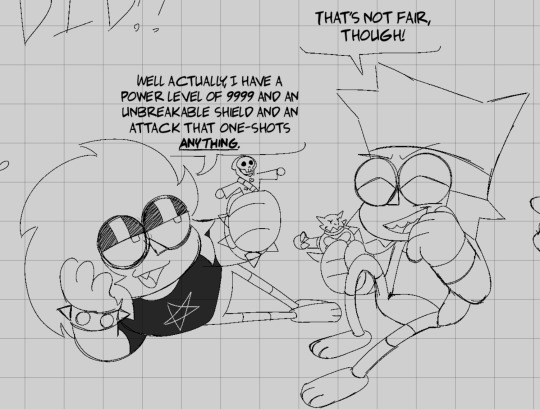
#digital art#my art#art#ok ko#ok ko let's be heroes#ok ko lbh#ok ko fanart#kaio kincaid#ok ko ko#ok ko tko#tko#they would totally play toys with eachother#and tko is totally that kid on the playground who makes himself the most OP#the action figures they have aren’t any specific characters#i was originally gonna make them my ocs but decided against it
509 notes
·
View notes
Text
How to comment 101
A fandom is the subculture inherent to a group of fans. It touches anything related to the field of predilection of such a group of people and is organized or created by these same people. And, like everything that comes from people, it is alive and requires exchanges to continue to exists.
People who receive no comments have often and at length express how lonely it can feel to be shouting alone in the void and how discouraging such silence can be.
I have found after asking around that readers aren’t unwilling to comment, but mainly don’t have the energy or know what to say.
Some readers have also expressed a fear of annoying the author, as they are clumsy with words, or feeling intimidated in front of an author who has such a talent with words that the reader's own words feel too embarrassing. Or not feeling that their own five word sentence is worth the bother.
Every word matters.
Every comment is worth its writing to the author.
I refer you to this post if you doubt the importance and impact of comments on fanfics.
To help those willing to comment, I have done a very modest survey of roughly 20 persons, writers and readers alike, and here is what I have come up with.
For writers:
Write in your notes, at the end of the fic, clearly what type of comment you do not want.
Clearly stating your limits and preferences helps readers who are uncertain or not very verbose to write in a relaxed way.
If they do not have the anxiety of offending, vexing or annoying the author, they will be more comfortable and therefore more inclined to write.
If you have repeated commenters, try to reply to their comments, even with just a few words. Some people who do not receive replies to any of their comments take the lack of response to mean the author is not reading comments at all, feel discouraged and stop commenting in turn.
If you do read the comments, but don’t want to reply for whatever reason, do say so at the end of the fic, in the notes, so that readers know what to expect and not be disappointed.
For readers:
Do:
About the story:
You can write about a particular line that you liked, the themes, parallels with canon or within the story, the characterisation, a character’s exploration, a/several character’s motivation, a/several character’s mindset/thinking/emotional reaction, a/several characters’ interaction, the plot, the action happening, the worldbuilding, emotions within the fic, subtext, pacing...
If you liked everything and are overwhelmed on how to narrow it down, you can just say exactly that. “I loved everything!”
You can also focus on pointing out just one moment, one line, one specific thing and why you liked them, specifically. What matters is not that you wrote a novel but that you communicated to the author what made you happy, what you enjoyed.
About you:
What emotions the fic made you feel, what you think is going on in a wip or what you (think you have) figure(d) out, what you are doing in real life while reading the story, afterward, because of it, and/or how the fic impacted your life (yay! motivation to make art!), how the fic is meaningful on a personal level because x, y, z, what it made you think of, like another fic, a book, a song, a movie, what subject/fact it prompted you to discover more of…
How:
You can write an essay, a prose, or some serious, meaningful, impactful words but you can also joke with the author as long as you stay mindful or polite. A lot of authors have said they love when people make jokes or break the fourth wall.
Unsure about your sense of humor? Here is an example: do not write "I hate you! How could you do this to me!” Write "How could you do this? The betrayal! die offscreen.”
Making a parody of what is going on with the characters with a few lines can be funny! Keep it positive. Not everyone has the same degree of sarcasm. But levity and good humor are always welcomed.
Small fics vs longer fics:
Emojis, keysmashing and incoherent yelling are very often correct comments for small fics or drabbles. (Unless otherwise specified.)
They are also loved in longer fics, (unless otherwise specified,) but people who have been writing a story for literal years appreciate you taking at least five minutes to say a bit more than that.
Try to go through all the “about the fic” and “about you” points above, methodically, and choose just two or three of them. Then write just one sentence per point.
If you really don't know what to say, look at other people's comments. Sometimes, you will recognise something you liked too or that you thought was really good. It can help and be the starting point of your own comment.
Long WIPs:
For long fics that you follow while they are being written, people have said they have at first a lot of enthusiasm for commenting, but find it harder and harder to know what to say as the number of chapters accumulate, and so does the number of comments they feel obligated to give in turn.
Please, keep commenting! Love keeps the writers motivated and helps creativity. It’s like shouting in the void and getting a high five back.
Even one line about something specific (a dialogue bit, a reaction, a plot maneuver) can make an author happy.
Writers are not really looking for length or details. They are looking for care. If you read something you liked, just point out what you enjoyed. That's engagement enough.
Comments aren't really about the act of a compliment. They are about the shared joy of a fandom or a ship or a character.
Example: “'X character diving headfirst into the sea like that is so like him!”
It’s good. It’s fun. It’s nice.
Some people have said to “save” a chapter, give a kudo and say “looking forward to reading this when I have time!” and wait until they do have time and energy to comment more at length, sometimes two or three chapters at the same time.
It let the writers know their fic is still being read. You just have to be mindful to not let months go by, otherwise, it goes back to leaving the author the impression they invested hours, weeks, months, into something no one interacts with. You can alternate strategies, lengthy comments, short comments, and commenting on several chapters saved.
If all else fails, go back to the tried and true. Choose one of the points above, choose just two or three of them and then write just one sentence per point.
If you are not a native speaker:
Google can help with the bare minimum. It's not great, but it lays the foundations. Write what you think in google translate and the translation will help guide your answer. You can always ask for help from someone else or warn the author that the fic’s language is not your native language, if you are unsure if your words come off in a tone not intended.
At the start of your comment, say “I am not a native speaker”.
Do not apologize. It’s not necessary. Just provide context. Use your words. Be clear.
Remember:
The writer isn't what they write. They do not necessarily headcanon what they write, nor do they necessarily approve of it in real life. Be mindful to not approve or disprove of x, y, z going on in the fic as if they do. You do not know that.
It’s not about the length or the wording or the quality of your comments. Of course authors love that. But what they love most of all is to hold hands, jump up and down with you and squee and gush about the fandom, ship or character.
It’s about the sharing of the joy.
Don’t:
Do not ask for another chapter and for the author to finish a fic.
Do not threaten the author to put their fics in an AI if they do not finish the fic.
Do not say "I didn't like it" or "I liked but not that" or "It would have been better if x, y, z." If you want to talk about what you didn’t like, whether it’s part or all of the story, discuss it with willing friends. The author is not responsible for you reading something you didn’t enjoy (how it made you feel) and persevering.
Do not “offer” to correct typos, grammar, vocabulary, facts, canon facts, characterisation, ect. unless you know the author and know they are fine with it or they say so explicitly in the notes.
Do not make demands. Do not.
Like that tumblr op said, “this is not the bespoke zone.” This is off-the rack. If the free suit is not to your liking, look for another free suit rather than demand to speak to the manager for "adjustments."
Tags are not owed to you. Ao3 is not a safe zone. Not everyone agrees on what degree of content merits each tag. Or what qualifies for a tag. So, if you found a fic that was more angsty than you expected and it broke your heart, comment on a part that was good and didn't make you sad, without saying you want a happy ending to the angst fic that was written for angst purpose. Off-the rack, remember?
Exemple:
"I found x,y,z to be upsetting. Would you consider tagging it?"
Vs "Your work is totally x,y,z triggery. You ought to tag it."
Vs "Hey, you do know some people find x,y,z, triggery, right?!? Because they do! So tag it!"
One of those answers is correct. The others aren't. No demands in the comments.
Your emotional well being while reading fic is your responsibility. If your expectations have been disappointed, do not say so. Talk about a point that was positive for you. If your expectations have been exceeded, do share!
Also, if you're mad, I have found that it helps to write your comment, leave it to decant, and wait a week or so to see what it looks like when you're in a different emotional mindset.
Some elements of fics can be very upsetting unexpectedly. It is not the responsibility of the writer to answer that. Nor comments are the place for it.
Once some time has passed, if you still want to talk about it, try to communicate in a way that is neither demanding nor negative. If you can't, talk about it with someone who is not the author.
My own personal opinion:
It can be so easy to focus on the fic and your own inner imaginary garden/cinema, that we sometimes forget to switch from "inner life" to "outer life" and exchange actively with people on both sides of the fence.
But it can also add so much more to the experience <3
Clear communication is always good. Even if you disagree. At least you know where you stand.
Say thank you. Fanfics are a gift. You have been given one. Say thank you.
#comments#commenting#how to comment#comment 101#ao3#ao3 comments#fic writer#fic reader#comment culture#fandom#fandom etiquette#fandom culture#fandom interactions#fandom things#fanfics#fanfic#fic#fics#writing commentary#writing comment#guiding comment#comment guide#comments guide#comment tips#life tips
385 notes
·
View notes
Text
a dive into Till’s feelings regarding Ivan and Mizi!
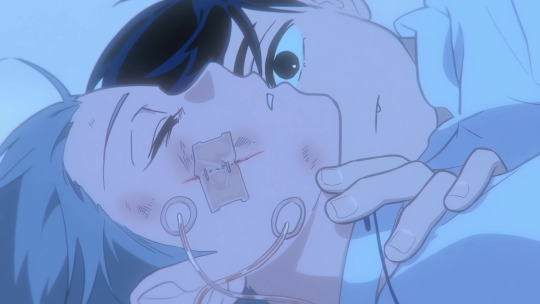
ivantill’s whole thing is being INSANELY complicated. i am a full on believer that they have mutual (unrealized) feelings, but i think the word “love” is definitely too vague to properly describe what they have. vivinos said a “deep LOVE/HATE” relationship for a reason.
i think till both genuinely feeling love for ivan yet hating him at the same time is absolutely reasonable. ivan has pushed and pulled till his whole life. till never felt secure near ivan, as much as he cares about him. but, ivan was always there. till felt comfort with ivan’s presence despite the lack of security he gave. till heavily valued ivan’s opinion, getting upset when ivan implied he didn’t see till as a friend. he trusted ivan enough to attempt to run away with him, and he potentially would have spent the rest of his life with ivan if they actually escaped.
i while love mutual love ivantill as much as the next guy, saying their feelings were 100% romantic is wrong. their emotions towards one another being so raw is something that defines them, which is why it’s difficult to put their mutual feelings into a specific box.
another thing we need to take into account is that neither of them know what love really is. they inhabit a world that isn’t MEANT for humans to love. they were never taught what love is and how to feel it. this is part of the reason they could never develop properly. they live in a world where the concept of romance and relationships aren’t properly established between humans.
but, i do believe like they could’ve had a chance under different circumstances. they were a slowburn that was never able to properly develop because, again, they lived in a world that didn’t allow them to, and they both ruined things for themselves. ivan had a huge tendency to self sabotage because of his severely low self esteem. he convinced himself that his feelings were shallow, and projected that onto till through his actions, confusing and distressing the latter. in addition, till was avoidant of the reality in front of him, ivan. due to till feeling such a lack of security with ivan, and never being able to understand ivan, he avoided intimacy with him altogether. till also just has a fear of intimacy in general. there was a significant amount of miscommunication between both parties.
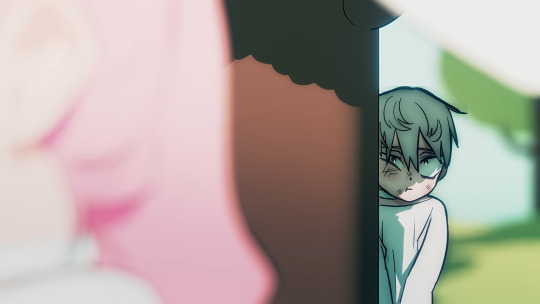
in addition, saying that till didn’t love mizi is just. false. he dedicated all of his life to her, she was literally his muse. he loved her in his own way, even if he had to put her on a pedestal to do so. yes, he didn’t know anything about her as a person, but that doesn’t mean his feelings weren’t real. saying he never truly loved her undermines so much of his character.
mizi was till’s coping mechanism, yes. he adored her from a distance. he liked the idea of her and not her as an individual, but that doesn’t make his feelings any less real. he loved and cared for her. we saw how torn he was after mizi disappeared in round 5. he almost DIED because of his grief, before ivan ‘saved’ him. his feelings towards her were as authentic as they could be for someone who kept everyone at a distance.
while you could say till’s love for mizi isn’t inherently romantic, the same can be said for ivantill. nothing stated in the patreon confirmed what EXACTLY till felt towards mizi besides her being a fantastical figure to him. and his “love” towards ivan doesn’t HAVE to be romantic (even though i believe it is), it could very much be platonic. vivinos is purposefully vague with what kind of love each character feels because, as i said, feelings aren’t something that can be properly established in this universe.
hope u guys enjoyed my rant Yay 🌹
#alnst#alien stage#alnst analysis#alnst till#alnst ivan#alnst mizi#alien stage till#alien stage ivan#alien stage mizi#ivantill
204 notes
·
View notes
Text
Asexual Reader x TWST Characters: Part Two! Rewritten
This is a rewrite of earlier posts I once wrote on a different blog. I am revisiting this and trying to improve on what I wrote and once again doing this for myself and other asexuals who lack the content and kindness others get. Writing this for every fanfic I've read where the character breaks up with the reader for being asexual and doing better.
That said, Everything will be entirely my headcanons and you aren’t required to agree with my interpretations of the characters and story.
(Part two)
Malleus Draconia
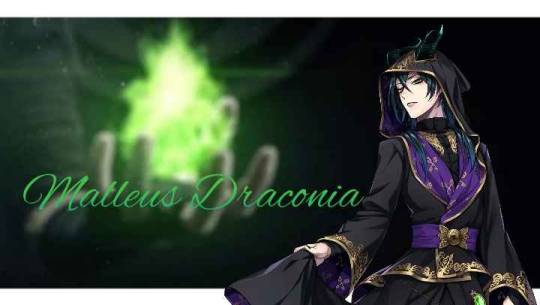
Malleus Has only considered two things. The fact he has loved his significant other more than most things he can think of, and that being royalty means a lot of complicated matters. But of course he is more than happy to reassure his significant other that he treasures more than anything in all of the realms and any dilemmas or choices to be made or had will be made together.
Malleus will do everything in his power to be supportive and an ally. It might start with getting a Flag, but it most certainly doesn’t stop there by any means of the matter. As I had said the first time I wrote the post, please imagine he gives you a locket with a picture of the two of you. Give or take some cheesy engraving, a decoration of everlasting love of the purest form or something akin to it.
As I'm sure I've already said before, and likely to say again in the future. Malleus will always make sure that you're okay with whatever physical touch he gives you. He'll be up most respectful of any boundaries that may change at any point.
Otherwise, there isn’t a whole thing to say. Due to being a prince his relationships were always going to be complicated and something he was going to figure out the hard way. So regardless he’ll fight to make sure the two of you will be happy in your relationship, whatever that may specifically look like for the two of you.
Jade Leech
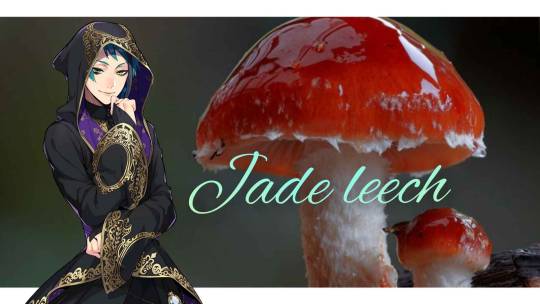
Going to double down on Jade being one of the most understanding people on this, he doesn’t need an explanation on what it means. The only questions he really has is what does that mean for you and what your comfort levels are with specific actions. Rather business casual, non stressful chat. Very clear communication will be had.
Unapologetically saying Jade Leech is also Asexual. So this honestly works out for himself. Your boundaries are respected, so are his. While he might not always be the most romantic, he does have his moments! They are thoughtful when he is and it will always be very endearing and something meaningful to the both of you.
While his gifts are usually very thoughtful and tailored specifically to your liking: it is non negotiable that you will get one mushroom terrarium as a token of goodwill, affection, and to generally remind you of him when he isn’t able to be around. It came free after listening to him info dump for about an hour about mushrooms.
Also, for the first time disagreeing with myself. Jade doesn’t usually cuddle, but like that mostly boils down to getting the right setting to get him to settle down to cuddle. Turn off his brain and eel cuddles. You will be trapped for at least an hour, longer if he can get away with it.
Riddle Rosehearts
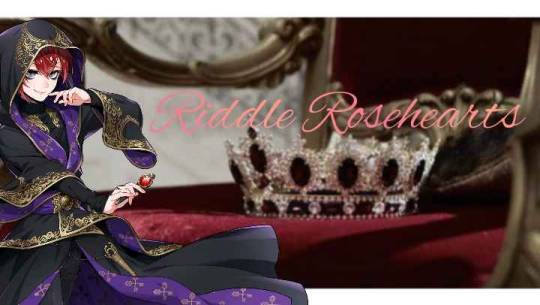
I will not be the first nor the last person to mention just how sheltered Riddle grew up. That said, despite at first having no good idea what you're talking about he is the most willing to ask questions to make sure he understands. He certainly is going to have to look into queer history in general to make sure he doesn’t make a fool out of himself later either. So he’ll definitely be supportive of you, any other queer people he ends up interacting with. You’ll just have to bear with him through his initial confusion.
Riddle probably has a mental list of what is allowed and what isn't allowed. If he can remember all the queen's rules because they're important to him, he can certainly remember things that you like and don’t like because you are important to him. This also means he gets good at memorizing what teas you like, and what kind of gifts you enjoy the most, or what ways you prefer to spend time together.
Unbirthdays, Birthdays, other events in which it is acceptable to give gifts or generally spoil a person: riddle will always make sure that there is something that you’ll enjoy. A single gift that will make you feel thought off, some sort of food dish that is to your preferred tastes. Afterwards is probably always spent with cuddles and a cup of tea to unwind. A break well earned if you will.
I think Riddle is more of a love letter kind of person than giving you poetry, however if he does give you poetry he is very embarrassed by it, and without a doubt its cheesy. But its cute. Everything down to the punctuation is thought over at least twice before he dares to give it to you, wanting only the best for you.
Epel Felmier

“why wouldn’t I still love you? You’re still the same person I fell in love with after all. You're just a butterfly who’s found its wings” Was a banger of a line and i will leave it here to be appreciated. Also considering that I headcanon Epel to be trans, he just gets it. Be might ask for a bit of clarification, but he gets it the fastest. Most understanding.
Will go out of his way to make you feel loved and appreciated! You will get the most random reminders that he cares about you and how much he loves you. Probably little notes and gifts for you, left where you’ll get them.
There are plenty of cute date ideas: picnics, apple picking, horseback riding, I could go on really. But the idea is that he’ll always bring you something, usually a snack of some kind. If he doesn’t he’ll make you a flower crown, or maybe weave flowers into your hair if that is more your thing. Regardless, it is sweet and fun. No expectations of anything else but to be in each other's company.
---
Part One | Part Two
#twisted wonderland#twst#TWST#disney twisted wonderland#disney twst#Twisted wonderland x reader#TeaoFics#Twst x reader#Asexual reader#x reader#x asexual reader#malleus draconia#Riddle rosehearts#Jade leech#epel felmier#Malleus x reader#riddle x reader#Jade x reader#epel x reader#malleus draconia x reader#riddle rosehearts x reader#jade leech x reader#epel felmier x reader
88 notes
·
View notes
Text
Astarion Ancunín x Bard Tiefling Male reader
Headcanons
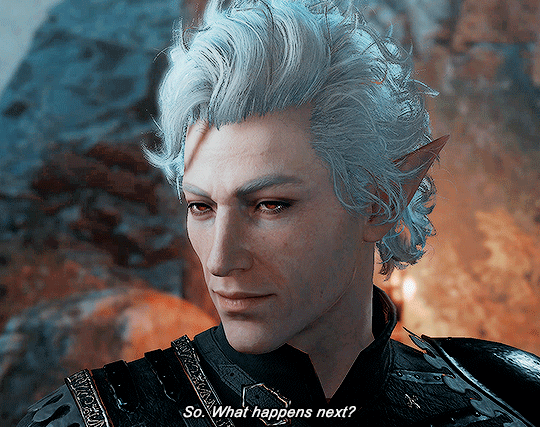
I’ve been playing Baldurs Gate 3 little by little, and I’ve fallen for this vamps’ charms. I blame Twilight. Reader is a Tiefling Bard cuz that’s what my player character is. I also have only played DnD like twice, so I know nothing about races or canon. If you guys have any cool dnd facts, let me know, id love to hear them.
Heres just some light and overall headcanons, there’s no specific theme.
In the beginning like any relationship started with Astarion, it wouldn’t be romantic from his part in the start. You, being a bard, have met and experienced a lot of people, so you can read between the lines in his actions though.
You aren’t cruel when it comes to helping others, not one to fit the stereotype some people seem to have for Tieflings and bards. You are just perspective, and you’ll need a reason to do something, having been burned so many times in the past by trying to be good.
Early on, before you knew he was a vampire, the two of you could regularly be found sitting a bit away from the fire at night as the others slept. You would play your instrument at a low volume, as the sound helped your allies sleep, and Astarion would stay nearby since you guys were allies.
Overtime it would develop into something more, you two would flirt, and feelings would actually bloom. It even reaches a point where you might start writing poems or songs about Astarion and your feelings for him, though you’d never show them to anyone, especially not Astarion, his ego is already big enough.
Astarion would struggle with the feelings he is developing for you, as we all know he would. In the beginning he would deny it, and try to convince himself that it was just something going hand in hand with lust, or something about being free and in the sun.
As the story goes on though, we all know that Astarion becomes softer and finally accepts his feelings for you. The two of you being shunned in ways from society, him being a vampire, and you being a Tiefling, probably helps build some solidarity too.
After you guys officially get together, hed start making jokes about you writing ballads about him and his excellence, and you’d joke there’s no need for that. In the end he would figure out the songs you wrote about him before you guys even got together, and of course he preens like a peacock.
I don’t know if Tiefling blood tastes different or has different properties, but to Astarion, the first time you let him feed on you, he would never be able to feed on anyone else. You are perfect to him, from the top of your horns to the tip of your tail.
When you guys cuddle your tail curls around him, and it even seems to do it without you realizing during the day. It becomes a joke amongst your friends, much to your embarrassment.
You being a Bard and Tiefling also means higher charisma, you two are probably lethal when it comes to persuasion or anything involving your charms and lies, especially when you work together.
I don’t know if Astarion plays any instruments, since he wouldn’t have been able to do so for all the years, he’s been under Cazador, or I assume so. But even if he did, I could imagine him asking you to teach him how to play your instrument.
You being a Tiefling also means you are warmer to the touch, and Astarion being a vampire means he doesn’t have any body heat. So, he’s like a big lizard or cat when you guys’ cuddle, just curling up in your arms or melting against your chest.
#male reader#tiefling reader#bard reader#tiefling bard reader#astarion#baldurs gate 3#baldurs gate#astarion x male reader#astarion x reader#astarion imagine#astarion headcanon#baldurs gate 3 imagine#baldurs gate 3 headcanon#baldurs gate 3 x male reader#baldurs gate 3 x reader#baldurs gate imagine#baldurs hate headcanon#baldurs gate x male reader#baldurs hate x reader#i love tieflings#and i love bards#so of course i had to play a tiefling bard
657 notes
·
View notes
Note
Like I do genuinely think they maybe should have replaced Radahn’s appearance with Godwyn’s instead? I know his soul has been slain, but I just like the idea that even the kindly Miquella is still on this naïve journey to become a god and bring back his dead brother to become his lord who honestly wouldn’t really be the same and would probably just be a husk of Death incarnate itself, but he wouldn’t care because he’s still grieving for him.
With that being said, the whole Metyr lore was super good, the whole reveal that the two fingers actually don’t really know what’s going on and they’re kinda just pulling shit out of their ass just adds a whole layer to the tragedy of the game, like all of these events were really for nothing and it just makes the Frenzy Flame ending and Ranni’s ending more understandable
ehhhh I absolutely see where the “it should’ve been Godwyn” mindset comes from and I agree with a lot of the arguments to an extent, but I’m not sure bringing back Godwyn’s soul entirely works for me?
I think Miquella’s attempts to return Godwyn’s soul were always going to fail, because his soul was completely and permanently destroyed by Destined Death. The ending to Gurranq/Maliketh’s quest is basically that things can never be the same again, so I don’t think there’s really a way to bring back Godwyn’s soul without it feeling like a contrivance? I really like the fact that he’s a character who can’t ever be brought back; his death was the catalyst for everything, a point of no return. Godwyn not being able to come back gives Ranni’s actions a special weight, that she was willing to permanently destroy his soul if it meant being free from the Two Fingers.
But with that being said, I absolutely see the sense in saying that Godwyn should’ve been Miquella’s lord. What’s strange to me is that Godwyn was set up in the base game to be a beloved older brother figure to Miquella — there’s the statue of him with Miquella and Malenia at the Haligtree, there’s the Golden Epitaph with Miquella’s prayer that he might die a true death, and there’s the spirit at Castle Sol, implying it was Miquella’s intention to return Godwyn’s soul through the eclipse. And now the DLC says that Miquella always looked up to Radahn as an older brother, when this relationship was never even hinted at in the base game, so it ends up feeling out of nowhere. If Radahn was always the one Miquella envisioned as his consort, then why is Godwyn the only brother he’s ever shown to have had a significant relationship with?
And, it’s also true that Godwyn ending the war against the dragons with diplomacy and bringing about peace really embodies what Miquella would consider admirable, since his quest in the DLC is in part to heal the hurts caused by Marika’s war of vengeance long ago. Radahn, on the other hand, is known for idealizing Godfrey, who helped Marika enact her wars of conquest, and for loving conflict so much that he literally fought the stars themselves. Miquella was said to have admired Radahn for his strength and kindness, but there aren’t really any instances showing Radahn being renowned for his kindness, except for his love for his horse? (the loyalty of his soldiers doesn’t count. Rykard had die-hard soldiers too and we know what he’s like)
On the other hand, I feel like Radahn as Miquella’s consort works thematically as a concept because Miquella’s journey in the Shadow Lands mirror’s Marika’s own ascent to godhood, and Radahn is like Godfrey’s spiritual heir. I’m also compelled by the idea of Miquella idealizing a young Radahn for his strength and kindness, only for Radahn to become corrupt during the Shattering, warring for the sake of war… which is why Miquella brings back specifically the young version of Radahn whom he idealized. It’s like a vision of Radahn colored by a child’s naïveté, and it belies the irony of beginning an “Age of Compassion” with the demigod who idealized war the most at his side. I think all of this makes for a more interesting story than Miquella somehow bringing back Godwyn’s soul.
BUT I still believe that this story was not developed enough. Again, we don’t SEE enough of Radahn’s relationship to Miquella hinted at beforehand, so this FEELS like a cheap plot twist. Godwyn was the one with the established relationship to Miquella in the base game, so it being revealed that Radahn was actually the one he always wanted to be his lord is like… huh? since when???
anyway I also really loved Count Ymir’s quest and the revelations about the Fingers… the Two Fingers say that the Greater Will hasn’t abandoned this realm, but I think it’s clear now that they’ve been without the Greater Will’s guidance for a long, long time. Since we know Count Ymir was Rellana’s teacher, I wonder if his distrust in the guidance of the Fingers somehow came to influence Ranni?
118 notes
·
View notes
Text
umm.. which d20 season should i watch (to start or next)??
in honor of brennan releasing basically the exact same video on dropout literally today, here's an unhinged list i've been working on for longer than i'd like to admit.
IF YOU’VE NEVER SEEN D&D BEFORE OR ARE LOOKING TO GET INTO TTRPGS • Fantasy High ⁃ I mean obviously. The cast is learning 5e right alongside the players, but also, they’re learning about each other. They’ve never played before. You’ve never watched them play before. There aren’t any inside jokes that you’re missing out on because you haven’t made them yet ⁃ The setting and characters are a great mixture of dnd tropes and familiar media tropes, so even the jokes you don’t get you kind of do also get ⁃ 3 seasons and a movie (counting the liveshows) • Unsleeping City s1 ⁃ Oh, you don’t like fantasy stuff. You find elves annoying. You’ve never seen Lord of the Rings and you don’t care to. Great! This season is urban fantasy and the fairies are all parodies of characters from the Godfather. ⁃ Still early enough that the cast is still fairly new and you’re not missing much. Also it’s incredible ⁃ 1.75 seasons and a stage production (one season, one covid zoom season that’s incredible but takes a sec to get used to, and a madison square garden liveshow complete with pyrotechnics) • Dungeons and Drag Queens ⁃ Learn with the queens. Love with the queens. Cry with the queens ⁃ Brennan is being a Nice Guy DM so generally things go how you want ⁃ It’s kind of like watching a bunch of people remember what it’s like to be in third grade and invent an entire world at recess and decide who has storm powers and who has seventeen imaginary cats and who has a sword that’s also a gun
I DON’T LIKE D&D BUT I STILL WANT TO WATCH!! • Mismag ⁃ They’re not playing dnd they’re playing kids on brooms and Aabria mostly eschews combat, so don’t worry ⁃ First season is a misdirect to get you to the second season ⁃ Smaller cast of characters and only one (haunted) white man. Sick. • A Court of Fey and Flowers ⁃ Technically still dnd but only for the purposes of letting these high drama idiots pretend to kill each other ⁃ They spend most of the air time sending letters, flirting autistically, and massaging butts ⁃ Emily Axford & Lou Wilson spend the whole season serving cunt and invoking jeremy renner • Never Stop Blowing Up ⁃ They made up their own action movie game system ⁃ “The universe was created by a big bang. And in that case, is not all of existence a bullet? You catch the cannonball and throw it at the helicopter” ⁃ Practical fart effects
THEY DON’T DO ENOUGH COMBAT, I THINK. I WANT MORE KILLING. • Coffin Run ⁃ Jasmine Bhullar loves combat. Every time you think she’s done there’s another mini ⁃ Complex train calculations have real world battle implications ⁃ Instead of hit points they drink blood • The Seven ⁃ A bunch of women gather together to kick the shit out of Brennan specifically ⁃ Combat flow charts! Rolling thirty d20 with advantage for your attack geese! Etc!! • A Crown of Candy ⁃ IH season most focused on combat. It’s also the most lethal. Brennan is actively trying to kill them the entire time ⁃ The roleplay episodes WILL make you cry so keep that in mind. This is the season that made Lou start smoking cigarettes again to cope ⁃ There are also the covid zoom adventuring parties which are great
I WANT THERE TO BE A MYSTERY I CAN SOLVE • Neverafter ⁃ This season is the perfect blend of mystery and all the other stuff that makes DnD a great game. Sick combats. Complex yet familiar world building. The line “the smile of a devil you never believed in.” ⁃ Players really at their best and fully dialed into all the various factions which is good bc the lore is HEAVY ⁃ Beardsley is the grandpa with the plot important prop and Murph is a silly divorcée so there are plenty of shenanigans still • Fantasy High ⁃ Every single season of this has a great mystery at the heart with enough clues that you could figure it out ahead of time, maybe. I never did but that’s a me thing ⁃ Brennan kept a secret for 5 years of his real adult life for the sickest reveal of all time. Sam Reich torturing Gamechanger contestants coded. ⁃ Riz Gukgak is there • Mentopolis ⁃ If Inside Out was a 1930s noir ⁃ Large part of the mystery requires them to contemplate what’s going on with their big guy’s junk… there’s buzzing down there! It’s narratively important! ⁃ Hank Green is there • Of Mice and Murder ⁃ I’ve never seen this one but it’s The Mystery Season so. I assume it fits well into this category
WATCHED A FEW SEASONS AND NEED TO KNOW WHAT’S NEXT • Starstruck ⁃ DON’T ask questions just watch NOW ⁃ The funniest season hands down and immediately post covid so the vibes are joyous. Stupid. Perfect. The first major battle includes an exploding MLM sex goo factory and it only goes up from there ⁃ Brennan’s mom is there • Burrow’s End ⁃ IMO one of the perfect ways to get into the d20 sidequests, especially if you’re like “ugh but I’m going to miss the intrepid heroes though…” ⁃ Every PC is related. Specifically Izzy Rolland (my beloved) and Siobhan Thompson (my beloved 2) are playing Brennan’s children and they are having a GOOD time ⁃ Three gross battle sets and a lightning gun
I’M TIRED OF LORE I WANT TO SEE THE GIRLS GO CRAZY • Time Quangle ⁃ The whole point of the tour was to go hm… what would happen if all the characters got smushed together and nothing made sense? ⁃ Does require some knowledge of previous seasons and has minor spoilers ⁃ Also has a Beardsley nat 20 so spectacular the PCs beat Brennan up right there on the stage in front of God and everybody • NSBU ⁃ The directive of the season from Brennan was “what if I never said no? What if I just yes anded everything that got thrown my way?” and YEAH dude he DELIVERED ⁃ Looked right at camera and said “Let me out baby!! It’s time for Daddy to have fun!!!” ⁃ Basically Beardsley is playing the straight man if you can believe it
#full disclosure this is based only on season's i've seen. so if there are others that fit i believe you. i just haven't seen them#d20#dimension 20#absolute masterlist. enjoy#mine
26 notes
·
View notes
Text
with the rest of wrong try again plotted out in full, i’ve started plotting out an idea for my next possible long fic. and it’s not a mystery so i can post about it now in case i don’t end up writing it in full!!! yippie!! so here’s my alenoah based superhero au :)
(under the cut cuz it’s a massive post)
i’ve been working on this idea slowly over the last threeish months!!! im happy with the ideas so far and wanna share what’s up to see if ppl are interested :)
the fic would be called “The Masked Mentalist,” in reference to our protag, Noah! he’s considered a villain in this au by society. alejandro is considered a hero.
here’s the characters and their powers i’ve got so far! still subject to change if needed :)
Noah: Villain. “The Masked Mentalist” is his given name by the city, although he doesn’t actually wear a mask. Noah has the powers of “mental manipulation,” stretching to about four different tiers that take more energy depending on how much effort it takes to manipulate the brain.
1: Audio hallucinations. He has a “trademark” of making the world go completely silent for his victim before he attacks. He frequently drops random noises or screams into his opponent’s head to throw them off. It harder to mimic specific voices, which is why he opts to throw ppl off rather than emotionally attack them. Easiest of his powers.
2: Visual hallucinations are harder, but it’s the one noah is the best at. He’s great as messing with people’s appearances, making them see him and other people who may be around as others or sometimes just in horrifying situations. It’s also very simple for him to make someone think they’re trapped in walls or things like that, easy to create objects. He still struggles to completely change the look of an entire location however, which is why he opts to fight in open areas where fake visuals are easier to conjure.
3: Emotions are harder as well, and it can be tricky. he’s very good at pulling emotions from others such as rage or grief, as they’re very easily overpowering emotions. It’s simpler when his opponent is a more emotional/vulnerable person, so he shys away from emotional manipulation in fights usually, especially when he doesn’t know an opponent very well.
4: Memories are hardest, especially if they’re more recent. It’s fairly easy for noah to go and change someone perception on a childhood memory, as it was likely distorted already anyways. The clearer the memory the harder it is to manipulate.
As you can see, all four of these powers have to do with the mind. The way people see or hear things, as well as feel and remember. Noah’s powers allow him to attack any of those in a person.
There’s also technically a fifth one, which Noah figured out to do by himself.
5: The way he figures out how to hypnotize people is through memory AND emotional manipulation. Altering memories and then yanking on certain emotions to pull through, can help him get people to think and even partially act the way he desires. It’s exhausting, and incredibly rare for him to use.
Noah is able to keep his identity hidden by simply altering his appearance to whoever he is fighting. He usually seeks out people when alone, and does his best to not hurt innocents, despite what the public thinks. Everyone who’s fought him/seen him in action describes him differently. Most people aren’t even sure if he even is a “he,” because he makes himself look so drastic sometimes.
He occasionally works with a partner, although they don’t consider themselves to be aligned in general when it comes to crime.
Kaleidoscope is notoriously known for her random crimes and activities. No one can quite figure out her goal or intentions, and so she’s dubbed a vigilante by most.
This of course, being Izzy! When Noah fights with her, he occasionally helps mask her identity from others. She’s a bit reckless, but the two have a history together. A traumatic one at that!
Izzy’s powers are deterioration. She’s able to break/take things apart/crumble things with her mind. Her powers can be as simple or as drastic as she desires.
(She met Noah by saving him from someone attempting to hurt him. By completely destroying their bones from inside their body. Noah was both horrified and grateful.)
Moving on! Alejandro, a “superhero” in our story.
Alejandro doenst have superpowers. At least not in the way our other characters do! Everyone simply assumes he does.
Alejandro is clairvoyant, which is considered a gift, rather than a superpower. His family exploited his talents as a child, so when he was old enough, he fled to be on his own. Nowadays he uses his predictions to help others, being able to foresee certain disasters and small issues. His powers waver depending on their severity, and he has a habit of undoing a certain villains work without even knowing.
He’s dubbed “The Good Samaritan,” when first seen saving people. Over time, the city began to think he had superpowers, and his name changed to “The Physic Samaritan.” Alejandro avoids media and press as much as possible, seeing as it was all he was used to as a child, so no one knows any different. This does not serve him well when real super-powered folk begin to see him as a threat.
Onto our two real superheroes! (so far!!)
Lashawna is the cities main superhero. She’s been protecting citizens for about two years before Noah makes his debut as a villain. She has very standard telekinesis, and is about the most hero looking and sounding hero out there. Her name is “The Golden Hero,” later changed to “The Golden Woman” when she gains a sidekick. Everyone adores her!
Courtney is Lashawna’s sidekick, appearing with her mentor only a few months before Noah shows up. “The Golden Girl,” her powers being one of information absorbing. She’s able to quickly learn anything she needs, simply by skimming words or touching an object… or person.
There’s a bit of a roadrunner scenario for a while between her and Noah, where she’s simply trying to grab him in someway or another, as the action would reveal his real identity to her. Of course, Noah is able to easily evade her, as her powers have little to do with physical superiority. (She’s still incredibly strong and fast. It’s Courtney we’re talking about here.)
Before I talk about our real villain of the story, I’m gonna discuss some plot points!
-Courtney feels incredibly undervalued and overlooked. She thinks if she can manage to reveal the Masked Mentalist’s identity, people would finally start to give her more credit. Lashawna tries to help her calm down, but she’s very fixated on her mission.
-Noah wants control. Deep down he has good intentions, as he’s attempting to dismantle the upcoming “Heroes Program,” starting up in his city, but he loses sight of it for a while. Alejandro becomes a bit of an obsession for him, as he somehow has the entire cities trust while barely being in the public’s eye. It drives him crazy.
-Izzy has so much depth, but acts insane as a defense. She and Noah had very similar upbringings due to their powers, and a fuckton of issues that now stem from it. She hides her pain by acting as though she’s invincible.
-Noah and Izzy have a very deep bond. They truly trust each other more than anyone else, even their civilian friends.
-Team e-scope is very much present! Owen and Eva are humans, and are still best friends with Noah and Izzy. Neither have any clue their two best friends are well known criminals.
Alright actual plot time. And backstory for our super-powered characters!
As usual when it comes to superhuman realities, the powers come from genetic mutations. No one is too sure how it started, but superpowered people have been showing up around the world for the last twenty-ish years.
Children found out to have powers were, of course, taken by the government. At first it was out of fear, but after a few years, the public began retaliating. “Programs,” were then opened, and while it was presented as a choice for parents, it simply was not. If your child had powers and was found out, they would be forced into a program.
Lashawna and Courtney were both placed into a program as young children. Both were released after a number of years to become superheroes. Most children taken are not released.
Both Lashawna and Courtney lack memories from their time in the program. They are conditioned to be perfect superheroes, deemed “safe” for society, due to their powers.
Again, as expected, these “programs” are just ways for scientists to study the mutations in the children. At first there was an attempt to stop it, but nowadays, there’s more of a goal to simply replicate it. Children are treated like animals.
Based on your power, and your behavior, there’s a chance to be released as a hero, such as Lashawna and Courtney, as an example that these programs are a good thing. It’s a way to keep people happy, and keep the more dangerous powers under wraps, at least until they can find a “cure,” or a way to create the gene themselves.
Because each person is different, each mutation acts differently in a person, explaining all the different powers seen. Super powers are still incredibly rare, although they’re widely accepted as a truth nowadays. Two powers acting exactly the same has never been recorded.
Noah and Izzy were never put in a program.
They were smart kids. Noah realized his powers early on in his childhood, and was terrified. Stories of powers had been shown in the news by now, and he wanted nothing to do with it.
His mother discovers it on accident after a year or two of Noah being aware. He panics and attempts to erase her memories of it, failing miserably and only hurting himself in the process.
She promises to keep him safe, just as horrified as he is at the idea of losing her only son. It’s a terrifying childhood for Noah, constantly having to be on the lookout, never being able to openly use his powers, something that so quickly became such a huge part of his identity. He turns to subtly using his powers in public, able to help bring more money and such home for his family. He becomes incredibly talented with his powers as just a teenager.
Izzy never told a soul. She’s had more accidents with her powers than she cares to speak about. She learns of her powers a bit later in childhood, but still before becoming a teenager.
A ten year old accidentally dissolving someone’s skin from their hand when being picked on is a traumatic experience for anyone, but even more so when she kills the other child out of fear. She flees the scene, and loses her shit. She quickly figures out she has a dangerous power, and being just as smart as Noah at such a young age, hides it completely.
She had much less control over her powers for a number of years, being scared of herself.
It isn’t until she sees a man pressing someone clearly struggling to a wall in a dark alley she truly uses her powers for the first time, and makes her first friend. (This friend being Noah, of course.)
Yes very dark backstories for the sillies! They have an insane trauma bond.
With their backstories, you can kinda gather why Noah wants to take down the programs starting up again. They’re much more public this time, and that worries him. He knows nothing good can come from children being forced into such a program, even if he was never in one himself. Izzy is more than willing to help him out for the most part.
The actual plot of the story, of course, is alenoah. This being said, let’s talk about that!
Noah wants Alejandro’s influence on others. Wants the social power the “superhero” holds.
He and Izzy devise a plan to get that influence on their side.
To keep things relatively brief, they corner him, and Noah is able to successfully uses his created hypnosis power on Alejandro, simply getting him to trust Noah, as a civilian.
As soon as the deed is done, he and Izzy pose as his worried friends, claiming he’d fallen and hit his head. When Alejandro questions who they are, Izzy immediately pipes up with “He’s your boyfriend silly!” and Noah. Just. Has to roll with it. He can’t risk changing the narrative so quickly for the boy with the currently muddled memories, and he also can’t berate Izzy right in front of Alejandro. So he agrees.
The two discover after a little bit that he actually is not a superhero, and lacks powers in general. This pisses Noah off greatly, thinking his work was all for nothing. He continues with his plan nonetheless, seeing as no one else knew Alejandro didn’t have powers. That could be an advantage.
Alejandro gradually puts the pieces together over time, never fully recovering his memories, but being able to see through the fog Noah placed over them.
Everything is going pretty well, even with the residual feelings both boy are gaining as they pose as a couple. That is until the real villain of the story shows up.
Duncan! His powers are the ability to create weapons out of thin air, his trademark one being flying knives. The weapons disappear as soon as they hit a target, only being created by his mind, and usually shown as a faint green color. (this is a working idea! still not 100% on it, but i definitely want him to have a weapon related power.)
He was in a program as well, ironically, the same one as Courtney. He was not released, he escaped.
Being dubbed a “dangerous power,” Duncan was set to live the rest of his life out as a lab rat. Of course, being Duncan, he did not like this fate! He’s one of the few children to ever escape, and the only one know to come back as a supervillain.
He’s angry. He’s angry about everything, and with everyone. He’s especially pissed off with Courtney, who he believes simply abandoned him. Courtney doesn’t remember who he is.
No more details for now! (Both because I haven’t planned out enough 100% to post about, and some of it is just for the story!) But I hoped you guys like my silly AU ramblings! I’m having a good time with this idea, so lmk if it’s something you’d like to see more of in the future :)
#total drama#alenoah#tdi fanfic#total drama island#tdi alenoah#tdi noah#tdi alejandro#tdi courtney#tdi duncan#tdi lashawna#superhero au save meeeee#this took forever to write out yall#but i hope you like it#:)
47 notes
·
View notes
Note
Do you have any ships in the ted lasso fandom that you enjoy? I just ask because most of your posts seem more interested in the gen side of the fandom. Are you more of a 'read about ships but write about gen' author? No hate, obviously, I'm just curious because that's pretty rare in my fandom experience! ✨
Thank you for asking! Sorry if this is a bit long. Answer to the last question is first and the ship list starts somewhere around the middle and includes some rarepairs that I think more people should give a chance
I’m pretty good and open to most ships on some level. I’m a ‘will try most things once’ sort of reader. However what I’ve learned about myself is that what interests me more is character dynamics and characters struggling with themselves rather than a lot of the popular romantic and/or sexual tension/buildup/catharsis tropes (slow burns, enemies to lovers, etc) I get why people read them, I’ve read them myself and enjoyed them, but I’ve come to accept that it’s just not what I personally want to write about
A few years ago I co-wrote a fic with a friend (the man from uncle fic), and my friend IS good at the slow burn, yearning, pining thing - in fact, hearing her talk about how much she enjoyed it and why was a big factor in my figuring out what I didn’t like about it and why I was struggling to write it. This is good! I think more people should consider branching out beyond the usual fandom offerings, but also that they should think about what’s not satisfying them and how find it- or how to make it themself, which is what I’ve been doing. Exploring the stuff I like to try to find what makes me happiest to write about
Which seems to be mostly jokes and psychological trauma with a side helping of people spending quality time with each other and supporting each other. And it turns out that a lot of the things I enjoy writing and reading (comedy, action scenes, ensemble dialogue) are the things that other people aren’t as comfortable writing, so I get to fill a niche as well!
Now. To go back to your question
I’ve always said I’d be interested in exploring what’s up with TedTrent. I think there’s a lot of intriguing potential in their interpersonal interactions and their overall dynamic as two middle aged divorced men. I’ve also commented before on the interesting parallel with Ted and Michelle and the way that Trent and Dr. Jacob both had very professional responsibilities to each of them, but whereas Trent gave up his career for the sake of doing right by someone he respected, Dr Jacob proceeded to date his client
I’ve also started a borderline crack fic that’s just Ted, going through a mild sexuality crisis, who keeps coming up with more and more euphemistic ways of saying he’s got the hots for Trent because he can’t quite bring himself to say it like a normal person ("He makes me want to ask my grandma for her blueberry casserole recipe" <- guy who has it bad)
Im also of course a big fan of Jamie, so I’ve read and dabbled in writing RKJ, RoyJamie, SamJamie, and DaniJamie, and Sam/Dani/Jamie. My take on Sam/Dani is that it’s a pairing that seems like it should work but i haven’t figured out what that looks like yet. Dani has a very hyper restlessness to him, and Sam a very calm one, so I think they would need to take breaks from each other
I’ve had half a mind for JanJamie as well, but I then I made up my own elaborate headcanon for my future fic so now I prefer them more as future coaching work husbands where Jan is very practical and steady and Jamie is the one with the creativity who inspires people and together they fight about football strategy until it’s time to go to their respective homes and then they do it all over again the next day. Which is the sort of wildly specific headcanon you can’t possibly expect someone else to have
I also made a post a million years ago about Jamie, Keeley, and Rebecca going to pride together and being confused for being an impeccably gorgeous queer threesome, and frankly I’m still here for that, although I don’t think I’ve ever seen a Rebecca/Keeley/Jamie fic in the wild. Honestly though, going back to what I said before: what I really want is the dynamic. I just want them to hang out together. Maybe I should send them on a spa day together — I already gave them a smoke break together, maybe after that they agreed on a spa day
Also BarbaraBeard sounds fun, for two characters who I don’t think ever met on screen. I feel like they would enjoy watching hockey together — and maybe Beard would forget about Jane if he found a woman who seems willing and able to deadlift him over her head
Whoever made that post years ago about how it looked like Colin and Moe were texting each other - you made a compelling point. Add to that the knitted scarf and Colin thinking Moe is the fittest one on the team, and ColinMoe sounds fucking adorable. They’d be so weird and confusing together and they’re both very passionate about very specific causes. I see it. I see the vision
I can’t believe I’ve never seen a word about DaniThierry. Come on. I’ve somehow had this in my pocket since season one and then season three gave us Dani smiling through being an absolute menace to him and Thierry being unbearably cringe but in such an earnest way (his “I like short walks on the beach” Bantr video fucking killed me I died)
And to cap off the list: I do like tedbecca, but it’s specifically the queerplatonic soulmate tedbecca in my head, where they light up the room for each other just by being nearby
#ask box is always open#again thank you for asking friend!#tagged for shipping#ooh boy where to start#tedtrent#royjamie#RKJ#samjamie#danijamie#Sam/Dani/Jamie#Sam/Dani#Rebecca/Keeley/Jamie#BeardBarbara#ColinMoe#DaniThierry#god this took longer to write than I thought
17 notes
·
View notes
Note
What do you think of Corlys Velaryon and Rhaenys Targaryen? I specifically ask about their political attitudes toward Daemon, Rhaenyra, Rhaenyra's children, their own children (Laenor and Laena), etc.
Corlys is a character I like; but I see him acting out of ambition rather than love. But I wonder how far his ambition has gone: did he suspect that Daemon killed Laenor? Did he really like Rhaenyra's children? Did he just support Rhaenyra in power or was he also afraid of her and what she could do to him?
These questions I also extend to Rhaenys. I feel like we got little from her (And she wasn't the only one, as F&B has a lot of issues), so it's hard to say to what extent she supported Rhaenyra because she was also a woman who had her rights taken away, or if it was just out of ambition (or both).
As I know that Fire and Blood has a lot of problems (even more in the Dance), I understand if I can't do a great analysis on these two. But I would love to know what do you think about them and their attitudes!
Sorry for any grammatical errors and thanks in advance for your response!
First off, and the ask somewhat identifies this issue, one of the major problems in relying on Fire and Blood to understand the personal feelings of any of the characters within that book is that the very nature of Fire and Blood severely limits such analysis. Because we are reading about Corlys and Rhaenys (and everyone else in the roughly century and a half of history the book covers) from the ostensibly objective historian perspective of Gyldayn, a figure who lived and wrote more than a century after Corlys and Rhaenys died, we can only experience these characters at arm’s length. We are not in their heads, nor are we in the heads of any individuals directly interacting with these figures; we can only glean elements of their personality via those historical anecdotes Gyldayn chooses to share, quite the difficult prospect. Although GRRM, via Gyldayn, does sometimes invent more personal moments for his characters despite the absence of in-universe sources for such moments or the practical implausibility of Gyldayn knowing about them - think of, for example, Cregan Stark’s conversation with Alysanne Blackwood - many figures are left frustratingly vague in terms of their internal characterization.
Consequently, Corlys and Rhaenys are, along with (albeit to varying extents) every other character in F&B, something of an enigma, at least in terms of personal thoughts and feelings. Just as I once discussed with Daemon Targaryen (in the question of his love for Rhaenyra as well as his feelings toward her “Velaryon” sons), there is very little to extrapolate from the (themselves limited) actions we have taken by Corlys and Rhaenys to determine how they personally felt about many of the people and events around them. Corlys, so far as we know, never reacted to the rumor (I think true rumor) that Daemon had his son Laenor murdered (and indeed, given his open bounty on Qarl Correy, I don’t know that Corlys ever knew or suspected as much); moreover, even if Corlys and/or Rhaenys were part of the “court and commons” outraged by the news of Daemon and Rhaenyra’s hasty marriage, this anger could well have been simply the expression of grieving parents shocked at the indecently quick remarriages (to one another) of their sometime children-in-law, and not necessarily also a reflection of any particular suspicion of Daemon. Likewise, both Corlys and Rhaenys obviously acknowledged Rhaenyra as queen following the death of Viserys I - but whether they did so solely because either or both wanted to see their “Velaryon” grandchildren on the Iron Throne, or also (and not mutually exclusively) because either or both wanted to support the claims of a female ruler in lieu of Rhaenys not becoming queen in her own right, is unanswerable.
On top of this, I think it’s important to note that for Westerosi aristocratic society, love and political ambition aren’t necessarily mutually exclusive. This is a point I made when talking about whether Ned and Catelyn would have allowed their children to marry for love alone, and it bears repeating here; even the parents (like Ned and Catelyn) who most clearly care for and love their children are operating in a socio-political system that mandates marriages be made for the advantage of their dynasties, not simply the dictates of their hearts. Rhaenys and/or Corlys can well have loved their children while also using their marriage arrangements for political advantage - and indeed, may well have seen the latter as an expression of the former, with either or both parents working for the advancement of their children as a way of showing their care for their children. To be clear, I don’t want to say every politically ambitious parent in Westeros is necessarily a loving one - Randyll Tarly had clear ambitions with both of his sons’ would-be or actualized marriage arrangements and is simultaneously a horrible human being, and that goes even more so for Tywin Lannister - only that I don’t think we as readers should automatically equate “ambitious” with “unloving”.
In that context, I think Corlys and Rhaenys are a bit of a mixed bag. The Velaryons certainly seem to have been willing to betroth Laena at a very young age, first to King Viserys and then to the son of the Sealord of Braavos - and in at least the former case, the apparent expectation that Laena would give birth to children sooner rather than later. I’m not saying that I consider Corlys or Rhaenys equivalent to, say, Unwin Peake (and his (unnamed!) daughter) - but just as I criticized that mega-creep Rodrik Arryn for not looking after his own daughter Aemma’s welfare in marrying her off at eleven to Prince Viserys himself, I think there is room for criticism of any Westerosi parent, Corlys and Rhaenys included, who participates in the disturbing pattern of shoving their daughter into marriage and childbirth at an extremely young age. Likewise, that Corlys and Rhaenys wished to have Laenor marry Rhaenyra despite Laenor’s own, almost certainly apparent unwillingness to do so is a reflection of their participation in that same socio-political system of dynastic continuity, and the unfairness inherent to that system; Laenor was no Loras Tyrell-esque third son whose elder brothers could wed and breed (or, indeed, a Daeron I-esque eldest son who could outsource the production of an heir to a younger brother), but the only male heir of a couple whose royal ambitions predated Laenor’s own birth. Still, while I hesitate to give Corlys and Rhaenys real praise for not marrying Laena to the Sealord’s son, given that the match seemed to be as politically hollow as it was personally disastrous, but I would like to imagine that Laena was more pleased to marry Daemon than she would have been that wastrel Sealord’s son (as indeed, her marriage to Daemon does not seem to have been facially unhappy); in that light, perhaps we can give a crumb of credit to the Velaryons for matching Laena with a more personally suitable husband. Too, I do think it’s worth noting a certain sense of fondness Corlys seems to have had, perhaps less to Rhaenyra’s elder sons as individuals as much as toward their identities as specifically Velaryons: when Jacaerys loftily declared that “[o]nly Targaryens ride dragons" (emphasis in original), Corlys supposedly “grumbled at this, insisting that the three boys were Velaryons, yet he smiled as he said it, with pride in his voice”.
Ultimately, and frustratingly, so much of Corlys and Rhaenys as characters is left to the imaginations of readers. Unless (and probably not until) GRRM writes a novella in their POV or interacting directly with them, they remain at arm’s length, sketched rather than fleshed out as personalities.
(Once again, this is not about That Other Show and please do not use this post to talk about That Other Show.)
38 notes
·
View notes
Note
Does Ser Arys Oakheart’s performance in The Queenmaker in AFFC (killing a handful of men and jumping clear of his palfrey before being swiftly dispatched by Areo Hotah) suggest a decent amount of martial competence on Arys’ part, in your view?
I’m going to make George R.R. Martin fans angry again and say, no. However, this is because I don’t feel any of Martin’s characters (throughout his work) really demonstrate any degree of martial competence. A lot of Martin’s characters aren’t supposed to possess any martial competence, but even the ones who are meant to don’t have it. Their “martial competence” is roughly the equivalent of action figures being angrily smashed together. For me, his fight scenes/battle scenes are the weakest part of his writing and I tune them out. Martin heavily focuses on “ironic” surprises and subversions of expectations like in the scene with Arys Oakheart, where everything is going well and then the character is just randomly and unceremoniously offed.
Boom. Goodbye.
“Like they would be in real life!”
I’m going to imagine someone yelling that because I’m sure someone, somewhere wants to.
Look, unlike Starke, I read A Feast for Crows and I genuinely have no memory of this character. They have been memory holed. They are gone. (Which is wild because I remember random minor character deaths from a lot of other major and minor fantasy properties that I read as a tween ages ago.)
The thing about reality is that real people are also capable of the following: Strategic and tactical awareness, long term strategic planning, working in unison with their fellow soldiers, and, yes, that includes knights in the Middle Ages. Knights in the Middle Ages might’ve (sometimes) been wealthy bastards, but they had to be functionally aware of violence and its impacts or they weren’t knights for very long.
Martin does not understand how armies and professional combatants function, their purpose, or their place in maintaining order in a feudal society. The irony is that politics are not his forte. His combat sequences read like they were written by someone who spent a great deal of time reading original historical accounts and not enough time thinking from the perspective of the people committing those gruesome atrocities. Make no mistake, medieval warfare was far, far more gruesome than anything you’ll find in Game of Thrones and the most terrifying part is the reasoning behind those atrocities was actually sound. Once you’re past the shock value, GOT is fairly comforting because the majority of the time no one makes sense. There’s a moral lesson hidden in the undercurrent ready to bludgeon the audience when they least expect it and all the violence works from that perspective, and all of it is written very specifically with the audience’s reaction in mind. Martin doesn’t seem to care how it works both on the technical front or in the utilization of violence to deliver narrative catharsis, he cares how the audience will react.
His violence doesn’t feel good, which is his intention, he doesn’t want it to feel good, but it also doesn’t feel bad. The violence just sort of exists.
One of the pieces of tragedy that is fundamentally important is a sense of foreboding. In fiction, death flags aren’t necessarily bad. In a tragedy, they’re necessary. Character death doesn’t need to be surprising to be meaningful. In fact, death is often more meaningful when the audience knows it’s coming. Whether it’s because they want the character to die or because they don’t want them to die. Their death creates narrative catharsis. The catharsis releases the tension, it feels good. Satisfaction through tears. When the audience and the narrative knows death is coming, it creates tension. If you invest early, the tension builds, and builds, and builds until it pops. The trouble is that, one way or another, the author has to invest in the character for that to happen. The surprise can be how the character dies, the manner of their death, and even who kills them, but not the fact they die. Shock value is sudden. The reason to use shock sparingly is that it lacks a lasting payout and eventually the audience acclimates. Too much shock obfuscates the narrative importance of a character’s death and shortens the long term impact of their loss. The impact of the death ends up as sudden as the death itself. Here, then gone, then forgotten.
In a well-structured tragedy, it doesn’t matter whether the audience cares about the character who dies or not. It helps, but the focus of the impact is on how it affects the other characters, how that loss is felt, and the way it’s internalized. An observation that’s always stuck with me is when I was in college studying Shakespeare, and my professor told us that Shakespeare structured his tragedies and his comedies the same way. They’re the same until the fourth act, and it’s the characters’ decisions leading into the final crisis which ultimately decides whether the story will end happily or tragically. All Shakespeare’s characters are important cogs in his play (including the bear.) When one of them goes, the narrative and the characters feel it. If a character is never important to the story, then the impact of their loss can’t be felt.
Martin’s characters don’t fight smart. They don’t fight cleverly. They don’t really fight stupid either. They fight with the combined equivalent of a single brain cell failing to function harmoniously. Probably the standout sequence for me that demonstrates this point is the Battle of the Crab from House of the Dragon. They had two dragons, a beach, an isolated cave system where their enemies were hiding to get away from the fire. They had corpses, and they had tar. And what didn’t they do?
Set shit on fire.
Smoke. Cave. Smoke. Cave. Smoke. Cave. Smoke.
The easiest and most low energy plan in the world that should be obvious to anyone who has ever cooked in an enclosed space. While this is a great way to signal that your characters suck at warfare, the characters involved were supposed to be the ones good at it! People being burned alive as they got smoked out of a cave is more gruesome than what actually happened and would have demonstrated the power of the dragons a lot better. Instead of, you know, the mighty House Targaryen being outwitted by… a cave.
If the dangers of dragons could be mitigated by a cave, people would just live in caves and not castles like they do on Pern.
Thank you for listening to my fanwank.
(No, the presence of saltwater would not have, in fact, saved the pirates. However, the Targaryens could have tarred the driftwood, set it ablaze, and let the tide carry it inside in addition to setting fire at every entrance like real military tacticians. Which shouldn’t be a reach given that half the army was made up of sailors.)
(They could’ve also used the crabbed up bodies for this with the added bonus of it being extremely horrifying, smelly, and gross.)
(We’re not talking about the Crab Army.)
(I mean it!)
-Michi
This blog is supported through Patreon. Patrons get access to new posts three days early, and direct access to us through Discord. If you’re already a Patron, thank you. If you’d like to support us, please consider becoming a Patron.
#house of the dragon#game of thrones#literary analysis#how to fight write#writing advice#writing reference#writing tips#michi answers
288 notes
·
View notes
Text
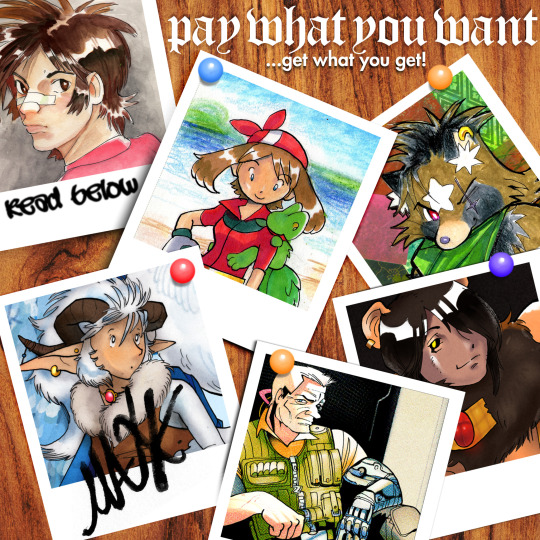
Max K. Commission Info
Summer 2025 🐍 🌾 🌺

Get PWYW OR structured commissions from yours truly! Thanks for reblogging, even if you aren’t interested right now.
NEW “Pay What You Want, Get What You Get” Guidelines ——————EXAMPLES ABOVE——————
To get a PWYW commission, please inform me of your budget and what you would like drawn.
All budgets, big or small, under the PWYW style will be handled the same way. Paying more will NOT allow you more control or more revisions. If you want more control over the piece, reserve the possibility for more revisions, have a very complex project in mind or a tight deadline, please check my Commission Packages below.
Pose,
presence of props,
simplification or stylization of the subject(s),
materials used,
size of the drawing, and
amount of body shown (headshot, bust, waist, full body)
are ALL subject to the artist’s discretion.
Digital touchups can be provided for important errors (adjusting skin tone, accidentally omitted element, etc.) but major revisions or artistic suggestions from the client will not be accepted.
Every PWYW commission will be delivered digitally with a white or plain color/gradient background. Art will be done on paper using primarily ink and water color, and will be done at the artist’s own pace. Expect a 2 week to 1 month turnaround. Commissioners will also be given access to a digital feed to track the artist’s progress.
PWYW is truly name your price. Please expect variety, looseness, and experimentation in the results.
All Commission Types 🖌️ 🎨
Packages
These are excellent starting off points for most common commission types. Additional specificity and complexity can be purchased. All basic packages can be done digitally or traditionally, include simple backgrounds, minimal/no props. All include full color, fully finished works.
Full Body Illustration - $50
An artistically rendered drawing of a solo character in an expressive, dynamic pose. The artist may take some interpretive liberty with the reference material. To include more detail for very complex subjects, or otherwise have more control over specifics, please choose the “Reference” option below.
Couple’s Illustration - $80
A waist up artistically rendered drawing of two characters in an interactive and expressive pose. Doesn’t have to be romantic couples - friends, enemies, family, pet & owner, or other pairs and duos OK.
Multipose, Reference, Environment, and Group Lineups - $100+
For commissions that require either multiple poses of the same character, groups, two character or more in full body, complex or action poses, or a character inside of an environmental background (vs. a simple backdrop). Reference pages can include close-ups and detailed shots. Perfect for a TTRPG party portrait!
Mini Illustration - $30
Chibis, portraits, icons, or details/props only would fall into this category in most cases! This price reflects a solo figure/pose only. Please see Multipose or Couple’s for any drawing with more than one figure.
Experimental Commissions
18”x24” Handmade Poster NOT AVAILABLE FOR 2025
artist’s choice of medium only. typically acrylic/mixed media. always on extra large poster sized paper. great way to celebrate your favorite OCs or canon characters!
paper clay figurine - $100
chibi humanoids/animals/ferals/anthros only. between 2"-3" cubed, give or take. armature wire, paper clay, paint, and varnish. these are delicate art items, not toys; not suitable for children. includes a photoset at no additional cost. PLEASE SEE SHIPPING INFO.
standalone comics page - $200
2-5 panels, 1-2 characters, 1 location. artist’s choice of medium only. can be OCs or canon characters.
PWYW commission
Please see ABOVE SECTION for PWYW info!
Ordering, Shipping, and ToS
How To Order & What To Expect 📬
Message me on social media, email me at [email protected] or fill out my google form
Send me visual and/or text references
Tell me about the characters personality or special meaning to you
Include any preferences or notes on important elements
Provide payment info - for ppal please provide your email!
Provide the email address I can send the finished artwork to
I will communicate with you and confirm your request!
You will be given a link to my Trello queue
Payment is due once the sketch is confirmed, or up front for new clients
Delays will be mentioned on the Trello feed
If your commission requires further input or revision rounds, I will be in touch
Refunds for started work or finished work are not available
Larger commissions ($200+) can be paid in segments if negotiated
Shipping Info
I am currently located in Taipei, Taiwan. Shipping is VERY expensive to the western hemisphere. Your artwork will be scanned at high quality and delivered to your e-mail for free. Physical shipping is provided at cost to anyone willing to pay for it. I have not as of May 2025 shipped from Taipei internationally, so this would also be experimental and your art may arrive damaged, delayed, or not at all. Basically, do this at your own risk!
Terms and Conditions 📜
Your commission is for personal use; icons, roleplaying, in your blog theme, as a wallpaper, or to print out and tape to your fridge. Commercial use may be negotiated in some cases.
Your final art is sent over Google Drive. I will either transfer ownership or delete the file after 7 days. Please download locally.
You must credit me on the platform used if reposted. Feel free to use art, with credit, on sites like ToyHouse.
You may not use my art to promote anything hateful or illegal. You may not claim it as anyone else’s creation. You may not use it for commercial uses, or to edit, adapt, trace, or directly reference, without permission. You may not re-sell my art, but you may trade it or gift it. I may use my art in my own promo material with no notice to you.
Unsolicited advice on my pricing or how I otherwise conduct my business is subject to a $1,000,000,000 fee via personal check, made payable to Joe Mama!
See examples in my art galley here.
Thank you for reading and/or reblogging!
#commissions#manga art#manga style art#retro manga#anime art#traditional art#digital art#artists on tumblr#oc art#pwyw art#pwyw commissions#artist for hire#ttrpg art#2dmax commissions
12 notes
·
View notes
Text
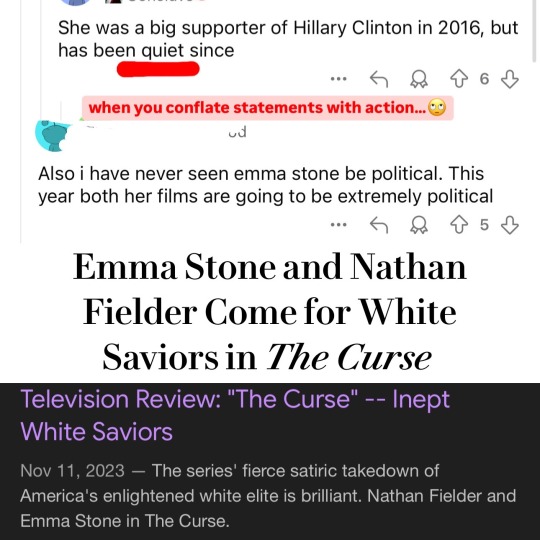

the devastatingly ironic product of performativity culture: when actions aren’t self-announced (and rightfully so), activists go unrecognized while the virtue-signaling whitneys of the world receive praise…
i’m so tired of living in a society like this. i thought i’d share my response to the comments above. from your resident black, female social scientist who will be an emily cultist (kok reference ofc!) for life 🫶🏽
what you’ve never seen is her be performative, but it’s clear from the thread you and a number of others have the value of statements and actions placed inversely. she’s become one of the most politically disruptive forces in the industry and is progressive to her core. she’s actually been cited as being aware of the power she holds as a white, wealthy and extremely prominent figure and actively wanting to leverage that power to shield marginalized creators and projects about the systems of oppression we face. again, she just doesn’t parade around announcing these actions like celebs are apt to do, not that performative liberals in society at large fare much better. to name just a few examples, she’s financed and advocated for ‘i saw the tv glow, a film about trans identity, that the director stated may not have even had the political resources it would’ve needed to be made without her given an unwilling distribution system (regressive studioheads), acted as the principal force behind the most damning interrogation of performative white liberalism we may ever see put to screen called ‘the curse’ (it was outright ousted by the industry in a shocking emmys shutout and these politics of hers alongside those of her colleagues likely played a significant role in this occurrence), produced projects like problemista and fantasmas, both of which explore the “othering” of non-white immigrants in america and were directed by someone of that identity (always important when specific experiences that person has faced in relation to their marginalized identity factors are a fundamental part of the project), starred in and shaped (she’s been referred to as his “sous chef,” meaning she takes on any number of responsibilities an AD often would, but unofficially, and is always cited to be the one who chiefly develops her characters whether she’s producing or not) yet another unrelenting interrogative piece on domestic violence and rape culture (kinds of kindness: the one no one would shut up about in regards to it framing humanity “too cruelly” when it was simply accurate and truthful), produced one of the most transcendently feminist and humanist films we have today (poor things), and so much more.
she’s for all intents and purposes the paragon of cinematic activism. by the way, “activism” does indeed mean taking action as opposed to announcing one’s political views before a stage to be applauded or wearing a pin to be declared an “activist” when both of these things do exactly nothing to contend oppressive systems. they merely serve to garner social praise from the masses, which is par for the course in regards to a society in which performative liberalism is worshipped. hollywood exists as a microcosm of it. her series ‘the curse’ (also produced by her) would tell you alllll about that. she was the one cited to have, and i quote, insisted upon characterizing her performative white liberal character truthfully as an outright monster: evil to the core while hiding under the guise of so-called “activism,” which includes an incessant amount of shrieking about activism whilst actively degrading the marginalized communities she claims to be allied with on her little pins. it’s an unprecedented and daring action due to the that most have a proclivity for affording sympathy to these characters and the real people they reflect, which grants performative white liberals and the performativity complex at large (anyone can be performative, but those of the white variety are particularly pernicious given they assert their white saviour complexes and use them to assist in their vulterine machinations) immunity from the scrutiny they deserve given they are just as bigoted as those we see express it in a more explicit way.
by “explicit,” i refer to the right wing/maga people, which a scene in the show that depicts her character and her lack of a single progressive conviction converse with a “maga” kind of guy who happens to genuinely care about indigenous rights and the environment- things she only shrieks about being interested in- delightfully enunciates. anyway, the creators/directors of the show even explicitly told emily that she didn’t have to go this far and assume such a risk given the subject of performativity in particular is an “untouchable” one, meaning people retaliate he meaning that people fiercely retaliate when it is rightly condemned (it poses the risk of alienating her audience and peers alike, as has been discussed in an article i highly recommend), but she deemed it a “modern affliction,” which are words i actually take kindly to given she’s undertaken actions to back up that stance.
christopher nolan himself presumed that she had to be cajoled into characterizing her performative white liberal archetype that way (accurately, as all sources of education should) due to the way in which it jeopardizes her status (based unjustly on popularity and likability…that show was actually review bombed to 17% on the day it released and remains in the 40s on rotten tomatoes despite the critical acclaim that, as i have previously stated, did not translate into what was at one point an all but ensured emmy WIN for her. film and tv critics spoke of the nomination as a literal formality due to how much of a pantheon performance it was, but they didn’t take its political impact in a performative institution into account). THAT is how political she is and her willingness to make personal sacrifices for the collective cause while receiving close to no recognition for it (only those who announce it seem to, which is abhorrent given no true activist does so. a true activist acts in the name of justice rather than virtue-signaling for praise) should do well to attest to this.
#emma stone#poor things#film#yorgos lanthimos#emma stone edit#bella baxter#emily stone#kinds of kindness#the curse#cinema#i saw the tv glow#social satire#social critique#social commentary#activism#white saviors#performative activism#performative allyship#bugonia#eddington#cinematic activism#trans cinema#feminist film#feminism
11 notes
·
View notes
Note
I know these are very different games, but do you have any advice for dragon age enjoyers (obsessives) starting to play bg3? I bought it for the vibes but am struggling with understanding the lore and the game mechanics/combat. Although the vibes still are pretty good
hmmm. i had the advantage of being secondhand familiar with dnd so the world and combat system was pretty familiar to me...
top advice: explore the whole hotbar (or that hateful wheel consoles have, ig) and make sure u know all the options u have for ur actions and bonus actions. a character’s stats (str, dex, etc) are only valuable on even numbers, respec all ur companions to even numbers as soon as you can. rest often, there is no ticking clock or punishment for doing so, it will restore ur health and spells and especially early on you will miss out on a lot of cutscenes if you don’t. but honestly in general bg3 especially on lower difficulties is a very forgiving game. it’s designed for people who don’t necessarily have it all figured out to be able to beat it
lore wise you mostly have to understand you’re in one of the most Generic Fantasylands of all time. there aren’t really the hard lore rules or the large scale social, political and religious conflicts of something like dragon age, because it’s designed to be a sandbox with all the familiar toys for you to make stories with, rather than to tell a specific story. it just wants you to have an adventure. so i guess instead of trying to figure out the world as a whole, take each area and conflict simply as it’s presented to you? for a choice-based game it’s extremely black and white, in my experience
38 notes
·
View notes
Text
Rowdyruff Boys On The Spectrum? [THEORY/HEADCANON]
his is such a stupid theory/headcanon but I just get the vibe for numerous reasons. Yes I know they’re four year olds and four year olds can do random things +most disorders like autism aren’t figured out until the kid is older. But screw it im projecting a tad being autistic myself so I’m putting it out there.
We all know the RRB definitely have PTSD so I’m not going to get into that one. I’m more gonna focus on autism and adhd.
Off the bat a big thing I can mention is stimming. The boys stim quite a bit. Mainly Butch and Boomer. And it’s usually triggered when they’re excited and can’t stay still or control said excitement. Biggest examples being The Boys Are Back In Town. Lots of stimming there.
Ways of speech and miswording. - People can stretch this to the boys being super young and that’s valid. It’s common in young kids. Show examples would be Bubble Boy, when Brick writes his graffiti. “BRIK WUZ HER”. But the main spots I’ve seen this happen is the comics. For example, CN Action Pack #6, Butch mixing up “invisible” with “invincible.” Certain ways they talk as well can be seen on the spectrum. Or at least that’s how I see it. Like when Brick mentions a bus to help their heist in CN Action Pack #4. Instead of Butch adding to the convo. he speaks on how much he likes buses and why. Or Brick stating he likes eggs randomly in CN Action Pack #6. Again kid stuff too, so see it how you like.
MANY examples here.
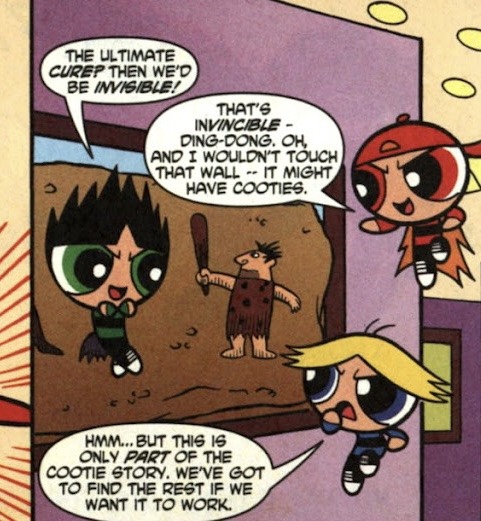

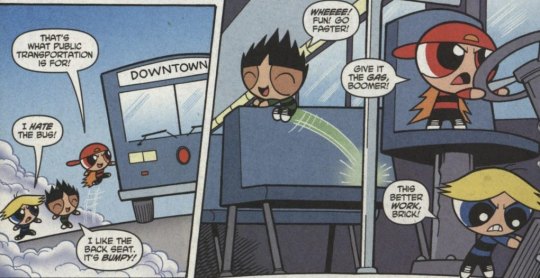
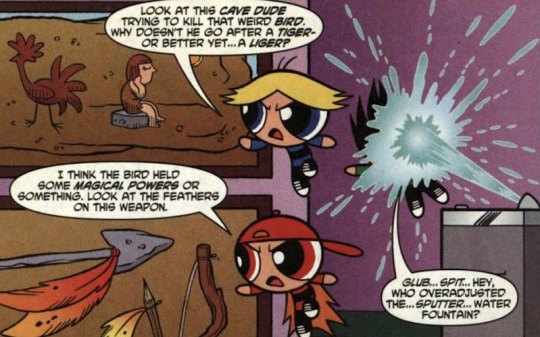
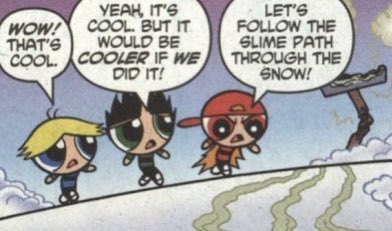
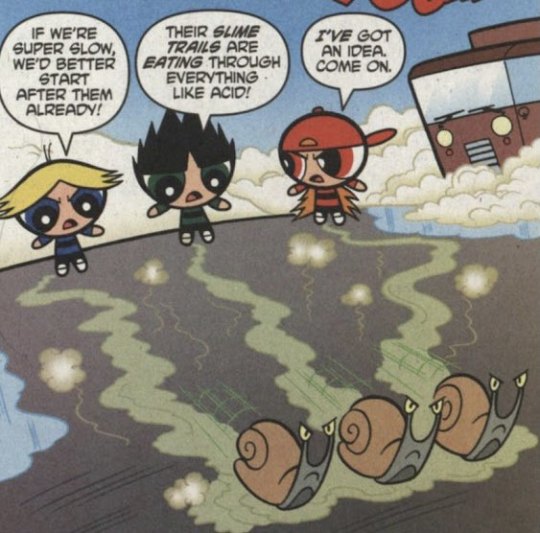
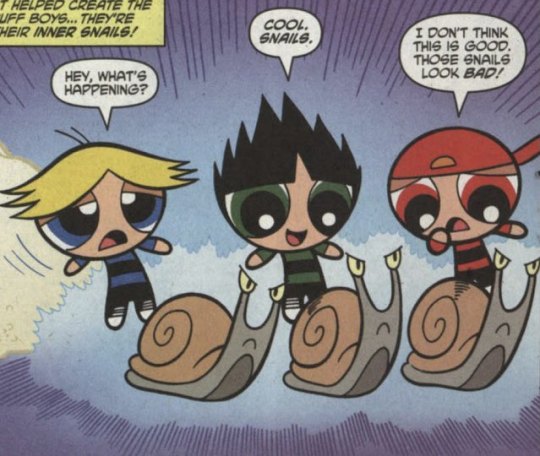
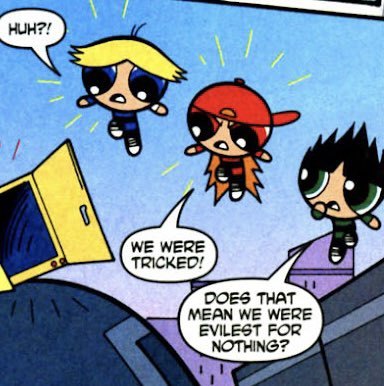
Distractions - Kid thing again but could be spectrum as well. The boys have sort attention spans and get bored super easily. An example here from CN Action Pack #1. Which also makes me think they would get distracted by their fixations a crazy amount.
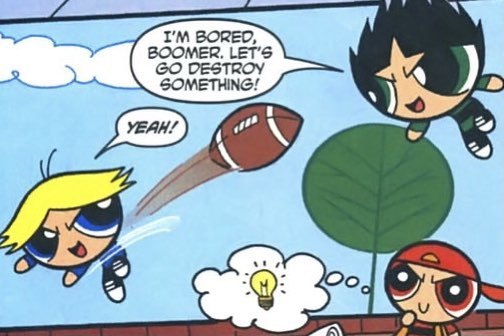
Fixations - Ok this is cheating cuz I spotted this in Multiversus but since it’s Ruff media I’m adding it. The boys definitely fixate to specific things. Like Butch with his constant ticks and urge to fight, while Brick fixates on The Joker. Wanna see what I mean? Watch these two videos.
Brick - https://youtu.be/paA3XZ0-Feg?si=PTaho72oYo18ZTVS
Butch - https://youtu.be/s92Ksrdk5aw?si=JvOlCBrV5yUIgf
Sleep Issues - Also Multiversus but it’s something I found interesting. The boys HATE getting up early and constantly have the urge to sleep. Perhaps from sleep issues or staying up late being mischievous. This one hit personal for me. Wanna see for yourself? Check this video out.
youtube
Triggers - Comic based this time, and this can line up to PTSD a bit more. But autistic people including myself can and do have triggers so I’m adding this too. The boys have a huge trigger to the idea of being kissed. As shown in CN Action Pack #6, when the girls defeat them with cooties. The boys don’t even try to fight, and fly away in tears. I count this up to PTSD, but I can definitely see the boys getting overstimulated in their own ways.
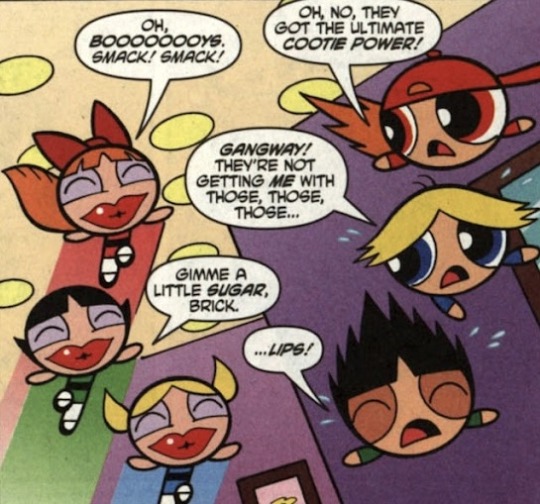
Repetitive behaviors - I feel this one speaks for itself. If you watched any RRB episodes you’ll see what I mean.
Honestly I’m out of topics so imma end this here. If you disagree that’s cool, I just like exploring characters' heads.
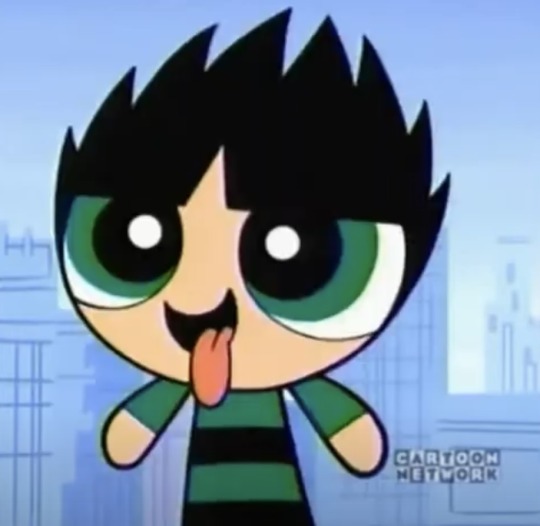
#I love them so much#they’re sadly traumatized fr#autism spectrum disorder#actually autistic#autistic things#neurodivergent#adhd problems#actually adhd#rowdyruff brick#rowdyruff boomer#rowdyruff butch#rowdyruff boys#these boys need a grilled cheese#headcanon#reblog if you agree#Youtube
23 notes
·
View notes
Text
Top 20 Wicked Witches

Halloween isn’t here yet, but I’m still on my run of October-themed lists for 2024! So, let’s talk about one of Halloween’s most famous archetypes: the Wicked Witch. Disregarding the long and rather controversial history of real-life witchcraft, fictional witches have been a staple in mythology, fairy-tales, and popular media as a whole for a very long time. From gnarled old crones and nasty hags, to darkly beautiful enchantresses who are as glamorous as they are grotesque, these mistresses of black magic are a mainstay in fantasy and horror alike. Of course, not all witches are evil: some, like Hermione Granger from the Wizarding World of Harry Potter, are generally very good and heroic characters. Even some witches who have a dark side, like Grandmama Addams from “The Addams Family,” aren’t really evil, they just have a sort of ghoulish sense of style. But no matter how much time passes, there will always be bad witches as well as good ones: figures of female power for both darkness and light. I decided to look specifically at some bad witches for this list. Some of them are hideous, some of them are radiant, but all of them match the basic description of “evil feminine magic-user.” There are a LOT of witch characters from various forms of media, so forgive me if any noteworthy ones YOU favor get left out of the running. With that said…here are My Top 20 Favorite Wicked Witches!

20. The Witch, from Into the Woods.
I wasn’t 100% sure how much this character REALLY counted as “wicked” witch, but by her own admission, “she’s not good, she’s not nice,” and she does do some things that are…morally questionable, to say the least. Plus, I absolutely LOVE “Into the Woods,” and I frankly don’t get to talk about it enough, so I’m giving her a spot here. For those who don’t know, this musical is the creation of the late, great Stephen Sondheim, whom many consider one of the greatest musical theatre masters of all time. The show is a mash-up of several fairy-tales together: in the first act, the stories intertwine and, by the end of the act, all of the characters involved have seemingly found their happy endings. This is all well and good, but the REAL kicker comes in Act II, when the characters learn that their actions (and inactions) from the first half now have far-reaching consequences, and that sometimes “happily ever after” isn’t so easy. The Witch is a central character in the story, who effectively jumpstarts the plot, as most of the major plot threads tie back to her twin goals of regaining her youth and beauty, and protecting her adoptive daughter, Rapunzel. While not necessarily EVIL, in the strictest sense, the Witch is a very self-centered character, and her self-serving nature repeatedly bites her in the rear throughout the story, with increasingly unfortunate results. At the same time, however, she’s one of the most rational characters in the story, often stepping in to halt the other characters as they bicker and fuss…though even then, it’s usually only for her own purposes. The character is typically treated as the “star attraction” in the play, as whenever there’s a really big name cast in the show, it usually goes to the Witch. Given how much meat there is to the role, it’s not a surprise that such names as Meryl Streep, Bernadette Peters, Donna Murphy, and Phylicia Rashad have all tackled the part with aplomb.
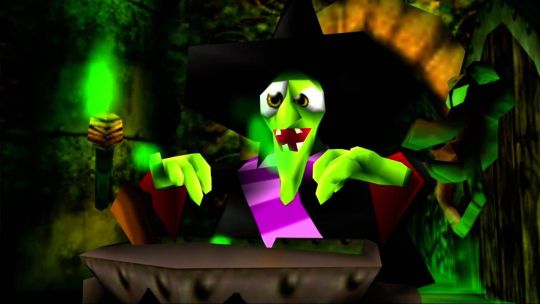
19. Gruntilda, from Banjo-Kazooie.
This silly sorceress is the main antagonist of the Banjo-Kazooie franchise, which focuses on the adventures of a bear and a bird trying to outdo the nasty crone in her many schemes. Gruntilda Winkybunion is a classic, cartoony witch, inspired by the Queen from Snow White. Determined to be the fairest in the land, she kidnaps Banjo’s sister in the first game, planning to rob her of her youth and beauty, thus turning the girl bear into a monster and transforming the gnarled witch herself into a smokin’ green bombshell. In later installments, the evil witch returns to seek revenge on those who took away her chance at glamor. While Grunty is not necessarily an idiot, she’s still a generally more humorous sort of character. Her ironic vanity and overconfidence constantly lead to her downfall, to say nothing of her faith in her many bungling minions. Though funny, she nevertheless poses a threat to the world she inhabits, and has many ways of coming back from her numerous defeats, even from beyond the grave! She may not be the scariest witch on the countdown, but she’s certainly one of the most entertaining.
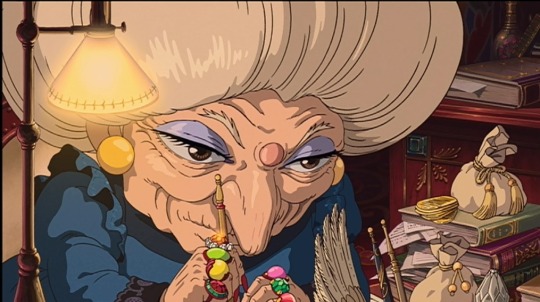
18. Yubaba, from Spirited Away.
“Spirited Away” is many people’s choice for their favorite film from the popular Japanese movie company, Studio Ghibli, as well as the debated masterwork of internationally famed animator Hayao Miyazaki. Influenced by various fairy-tales and pieces of folklore, the story tells of the adventures of a young girl named Chihiro, who ends up lost - along with her parents - in the spirit world. After her parents are turned into pigs (it happens), she goes to a bathhouse run by the wicked hag Yubaba, to try and find a way to get home. Yubaba tricks Chihiro into signing a work contract with her, and steals Chihiro’s name away, giving her the new name “Sen.” As time goes on, Sen begins to forget her name and her true identity: if she completely forgets her true self, she’ll be Yubaba’s servant for the rest of time. Sen must thus find a way to regain ownership of her name and escape the spirit world and Yubaba’s influence. Yubaba is one of the few proper villains to appear in a Studio Ghibli film, and she’s a very fun character. While absolutely the villain of the story, she does have some standards: she considers herself a businesswoman, and genuinely respects hard work and determination. She even starts to form a sort of affection towards Sen, despite everything. The old witch also genuinely loves her son, Boh, spoiling him absolutely as rotten as herself. Boh later learns his lesson, but Yubaba…well, the jury is still out on that one.
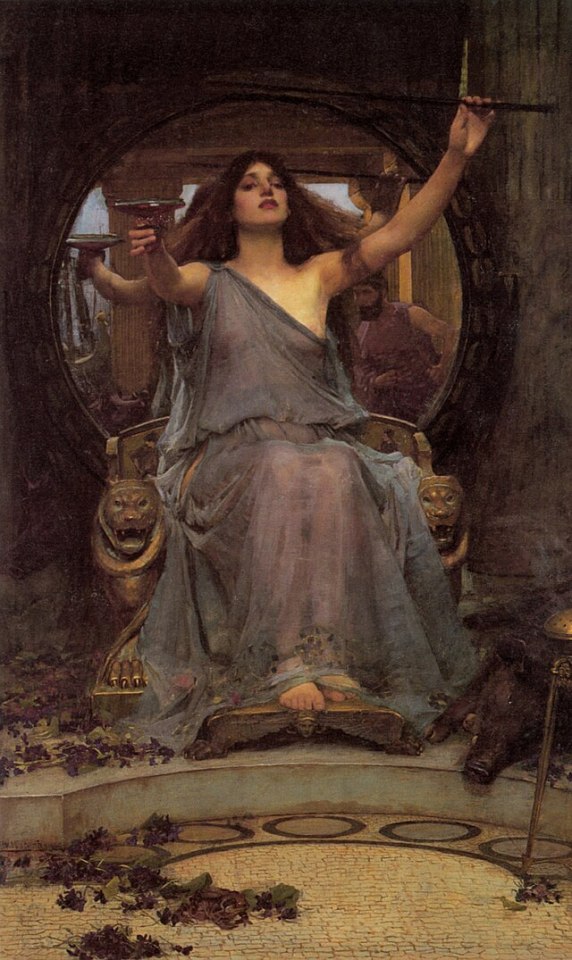
17. Circe.
It’s difficult to say who the first witch character in fiction is/was, but I think a fair argument could be made that Circe - a figure of Greek Mythology - could certainly be considered AMONG the first, at the very least. This enchantress was the ruler of the mystical isle of Aeaea. The daughter of the Sun God, Helios, and a water nymph named Perse, Circe was closer to a deity than a human being, and had the power to match it. Circe was prone to jealousy, and seemed to enjoy toying with mortals either out of spite, or for sport, or for both. With her magic wand, she could turn other people into all sorts of beasts. In the famous legend of “The Odyssey,” she transformed most of Odysseus’ crew into pigs, until he agreed to live with her for a year. In another legend, she transformed a nymph named Scylla into the legendary man-eating sea monster of myth, in a plot of revenge. In still another, she punished King Picus for rejecting her advances by turning him into a woodpecker. The character still survives through various modern interpretations (my personal favorite is the one from DC, where she’s a frequent enemy of Wonder Woman). Depictions of the sorceress range from her being a mischievous trickster who is more chaotic than truly evil, to her being an outright evil entity. As one of the longest-lasting examples of an antagonistic witch, she definitely deserves mention here.
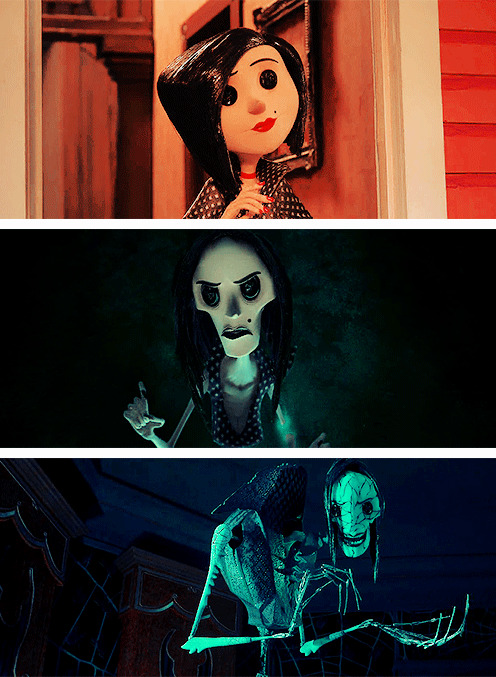
16. The Other Mother, from Coraline.
While I count the Other Mother as a witch, since she has been classified as such in other sources, this character is sort of an iffy case. It’s not really clear what or who the Other Mother actually is. Alternatively referred to as “The Beldam,” she is a mysterious and otherworldly being who lives in a parallel world, where she lures unhappy children by pretending to be a nicer, more indulgent version of their actual mothers. The Other Mother creates a universe where the child will have everything they ever wanted, be able to go on all the whimsical adventures they could ask for, and where every person they know is now a much more interesting version of their real life selves. Once the child is “fattened up” with all this joy, the Other Mother convinces them to sew a pair of black buttons onto their face in place of their eyes. It’s not clear exactly what happens then, but once they obey, the Child’s soul belongs to the Other Mother, and she devours their bodies. In both the original novel, as well as the more famous animated movie adaptation (which, to its credit, stays largely true to the book), as time goes on throughout the story, the Other Mother’s appearance changes steadily, from looking identical to Coraline’s real Mom, to resembling some twisted, warped, disgusting monster that hardly resembles the real woman at all. Her origins, the nature of her powers, and even her EXACT motivations cloaked in mystery, the Other Mother is one of the creepiest characters on this list.
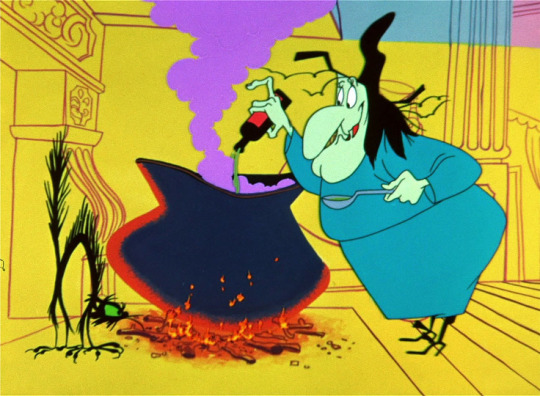
15. Witch Hazel, from Looney Tunes.
In contrast to the mind-numbing horrors of the previous choice, Witch Hazel is one of the most lighthearted contenders, and by far the most LITERALLY cartoony. First appearing in a parody of “Hansel and Gretel,” this hyperactive hag didn’t appear in a ton of cartoons, but she’s nevertheless fondly remembered. Most of the time, Hazel is looking for some hapless animal to cook into her stew for supper, or else seeking some sort of special ingredient for one of her many poisonous potions. While not especially bright, her powers and her tenacity make her a dangerous character. Hazel is largely entertaining because of just how EXCITED she always is: she’s almost always bouncing around from scene to scene, and clearly having a blast doing whatever she wants to do. Like many great cartoon villains, and especially those from the Looney Tunes library - similar to Wile E. Coyote or Sylvester the Cat - she never wins, but you almost want her to, simply because she’s so much fun to watch.
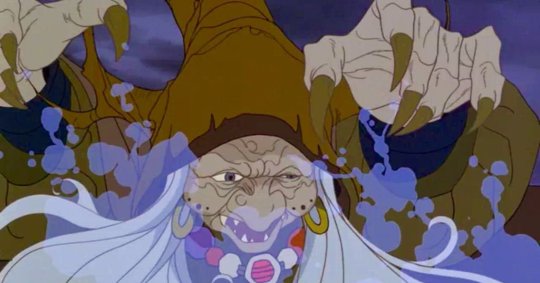
14. Mommy Fortuna, from The Last Unicorn.
While this haggard old hag (see what I did there, folks who know?) is a relatively small character in the story, her role is still important, and she’s easily one of the most memorable antagonists in the tale. “The Last Unicorn” was a fantasy novel written by Peter S. Beagle; it was later adapted into an animated feature film, produced by Rankin/Bass, with Beagle acting as the chief screenwriter and having a major role in helping to cast the picture. The plot of both the novel and the film is basically the same: a Unicorn, who believes she may be the last of her kind, leaves the secluded safety of her woodland retreat to try and find out what has happened to the rest of her species. Early on, she is captured by the wicked Mommy Fortuna: a witch who runs a traveling show called “The Midnight Carnival,” where she puts on displays of mythical beasts she has apparently captured with the help of her fellow showmen. It’s ultimately revealed that nearly all of Fortuna’s legendary creatures are mere illusions, as she uses her magic to make ordinary, rather shabby animals appear to be fantastic beasts. The Unicorn is one of only two actual, immortal beings she has successfully managed to ensnare. The other is the vengeful harpy, Celaeno. Fortuna has become obsessed with her capture of the harpy, and though she knows the Celaeno will literally be the death of her, she takes not only comfort but PRIDE in the fact that the creature will never forget the years she spent as the prisoner of the witch. The character was voiced in the film by Angela Lansbury, of all people; if you ever wanted to know what Mrs. Potts would sound like if she just completely lost her mind…well, first watch “Sweeney Todd,” then maybe take a look at this picture.
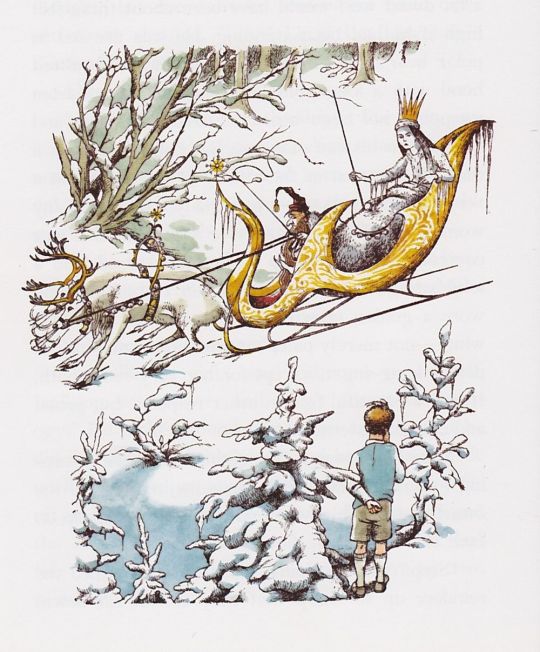
13. Jadis the White Witch, from The Chronicles of Narnia.
Inspired by Hans Christian Andersen’s “The Snow Queen,” the White Witch - a.k.a. Jadis, a.a.k.a. The White Queen - is the primary antagonist of two of the Narnia novels: the original story “The Lion, the Witch, and the Wardrobe,” and a later prequel tale, “The Magician’s Apprentice.” Though beautiful, she is thoroughly and horribly wicked: a vain sorceress whose heart is as cold as the icy winter she plunges Narnia into during her reign. Jadis is not only a highly gifted sorceress, but also incredibly strong physically, making her a particularly dangerous force to be reckoned with. Any who stand in her way are tortured, killed, or turned to stone; sometimes all of the above. She is capable of appearing kind and helpful at first, but only when it suits her needs to manipulate people to her side. While the White Witch is a very iconic villain (arguably more iconic than her inspiration, since most versions of the Snow Queen actually bear more resemblance to Jadis than anything from Hans Christian Andersen), I don’t necessarily automatically think of her when I think of the phrase “wicked witch,” so I’m ranking her somewhat lower. Make no mistake, however, she is a marvelous character, and worthy of placement.
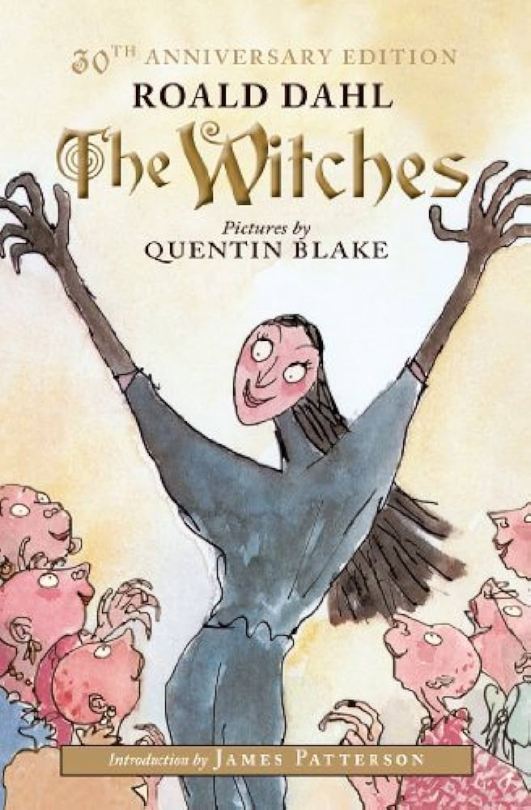
12. The Grand High Witch, from The Witches.
Arguably one of Roald Dahl’s darkest children’s books (and that is saying a LOT, believe me), “The Witches” is a book all about…well…witches. In this universe, witches are not just treated as spellcasting crones, but rather almost as another species…a species of pure evil, who LOATHE children. Why do they loathe children? Because kids stink…literally. Witches find the scent of children so repellent, they will do ANYTHING to eradicate as many little boys and girls as they can from the planet. The most notable of the evil ladies in the story is their leader: a mysterious and diabolical figure known simply as the Grand High Witch. In both the book and each of the two feature film adaptations that have been released (one starring Anjelica Huston as the Grand High Witch, the other starring Anne Hathaway), the Grand High Witch presents herself at first as a beautiful, glamorous woman…but this is quite literally a mask. Underneath her disguise, she is a nightmarish beast, almost too repulsive to describe, with a voice that’s described as sounding like something crackling over a fire. Easily the most feared and powerful of all witches, she will quite literally fry those who dare question her authority, courtesy of white-hot beams of energy she can shoot from her eyes. She’s easily one of the most unsettling and frightening witches on the list, no matter which interpretation you look at.
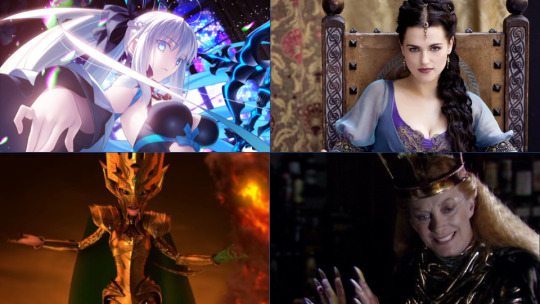
11. Morgan le Fay.
One of the original dark sorceresses of literature and myth, Morgan le Fay ranks low because how wicked she is, and what kind of person she is, tends to vary depending on the adaptation or reimagining of Arthurian lore you actually look at. In some cases, Morgan is not really evil at all. In others, she is a cruel but elegant sorceress who will stop at nothing to achieve her evil ends. In still others, she is a more sympathetic villainess, whose dark deeds are fueled by tragedy, or who shows a noble side to her character beyond her diabolical actions. Even her name has changed: she’s been Morgan le Fay, Morgaine, Morgaine le Fay, Morgana, the list goes on. It’s the constant reinventions of Morgan that keep her out of the top ten, but they also showcase her single greatest strength: she is, almost without a doubt, the most famous villain in Arthurian legend (in the ones where she IS a villain), the only other possible exception to this rule being her son, the universally black-hearted Mordred. Arch-nemesis to both King Arthur and Merlin, as long as their stories are told and retold, Morgan will be following close behind in some fashion or another.
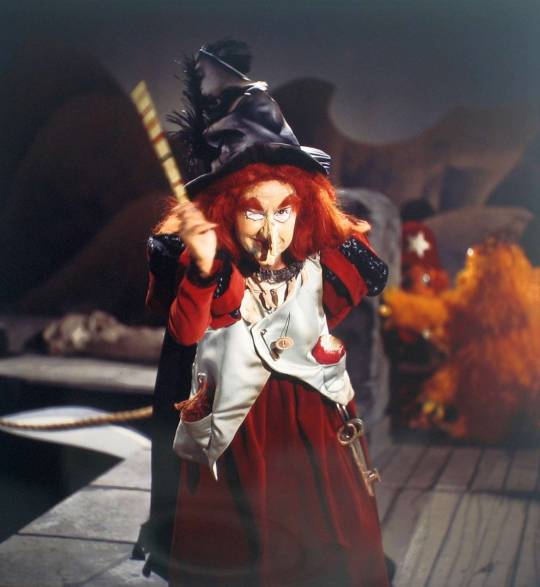
10. Witchiepoo, from H.R. Pufnstuf.
Another more lighthearted enchantress. A lot of you probably don’t know much about this character, if anything at all, but I’ve always had a soft spot for the (hilariously named) Witchiepoo, the main antagonist of the classic children’s series, “H.R. Pufnstuf.” The series focuses on the adventures of a young boy named Jimmy, who ends up stranded on the shores of a peculiar fantasyscape called Living Island. He works with the town’s mayor, the titular Pufnstuf, to keep peace across the isle, and foil the machinations of the villainous Witchiepoo, who forever schemes to - you guessed it - take over the world. Witchiepoo is about as cartoonish a witch you can get without being an ACTUAL cartoon; think Witch Hazel and then make her a live-action character, and you’ll have a rough idea. I got to see reruns of this series a lot growing up, and even owned a Witchiepoo plush toy as a child (sadly, I no longer have it), so this character has always had a soft spot for me. Much of the credit for her power as a character goes to her performer, the late Billie Hayes. She reprised the role in “The Paul Lynde Halloween Special,” where she was revealed to be the sister of the Wicked Witch of the West…which…I guess means Witchiepoo is the Wicked Witch of the East? (Wonder how she came back from having a falling house crush her spirit…AND her body.) Interestingly, Hayes also played a very similar character in the film “The Black Cauldron,” in the form of Orgoch, one of the Witches of Morva. I guess she just had a very specific and delightfully wicked type.
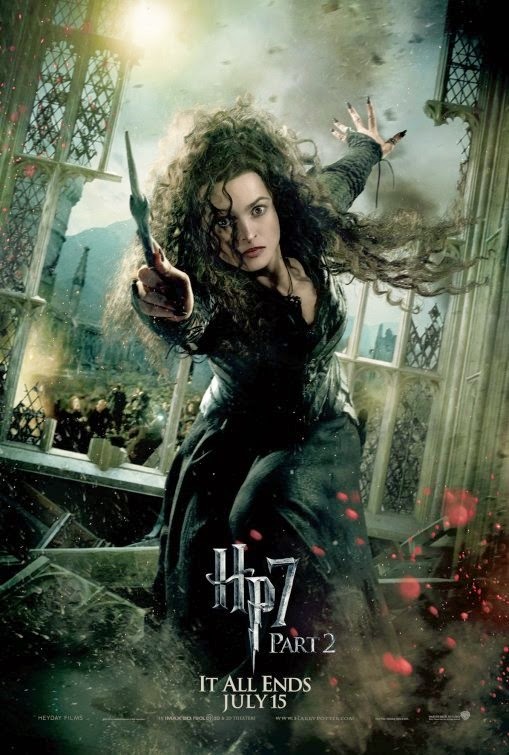
9. Bellatrix Lestrange, from Harry Potter.
While there are many witches, both good and bad, in the Wizarding World of Harry Potter, arguably none are as delightfully wicked as Bellatrix Lestrange. (Please don’t bring Umbridge into this mess, I said DELIGHTFULLY wicked.) Bellatrix is one of the most notable antagonists of the series, both in the films and the books…which is funny, since she actually doesn’t appear till the last three novels, and, by extension, the last four films of the original Harry Potter movie series. Rotten to the core, this mad witch is arguably the single most devoted of Lord Voldemort’s Death Eaters - an army of dark wizards who wish to conquer the entire world. Some do it for love of carnage. Some do it because they believe they are superior beings. Bellatrix does it for both reasons. She is sadistic and ruthless, gleefully tormenting and killing anybody who crosses her. Her personality flips from a zany, childish madwoman to a vicious, psychotic killer at the drop of a hat. In a way, Bellatrix feels like a sort of crossroads between the archetypal nasty crone many Wicked Witches seem to be, and the more glamorous dark sorceress type you’ll find in characters like Morgan le Fay or Jadis. She’s not necessarily bad-looking, but she’s not all there…I would say that perfectly describes her mental state, but that would imply there was ever a good soul there to begin with. Unfortunately for Harry and his team, that’s not the case.
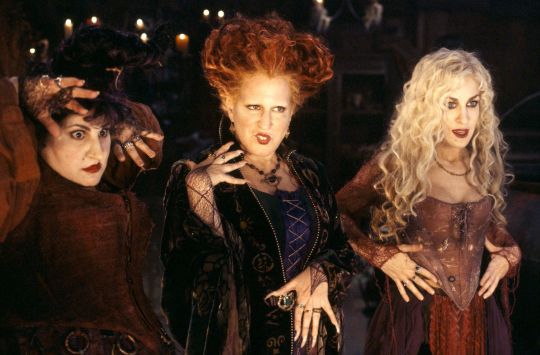
8. The Sanderson Sisters, from Hocus Pocus.
Well, you can’t have a list of great wicked witches without these three, in my opinion. This Halloweentime cult classic is largely remembered JUST for these characters; I don’t think too many people care that much about about Max, Dani, or…(thinks)...okay, maybe SOME people care about Thackery Binx, but certainly not as many as those who care about the Sanderson Sisters! These three evil spinsters were executed during the infamous Salem Witch Trials (apparently, not ALL of the victims were innocent). They were caught in the middle of a plot to consume the life force of every single child in the village. However, before they were hanged, they cast a spell that would summon them back someday from beyond the grave…and three hundred years later, in 1993, they get their chance. Winnifred, played by Bette Midler, is the leader of the group, being the smartest and most cunning. Mary (Kathy Najimy) is arguably the silliest of the trio (which is saying a lot), but has the best nose, being able to sniff out kiddy-winks like the Child Catcher. Sarah (played by Sarah Jessica Parker) is a childish airhead, with a salacious edge to her personality. All three have the power to mesmerize people with their voices, siren-style. The actresses find a great balance between being entertainingly goofy and actually quite creepy and dangerous when necessary. The film’s popularity has only continued to grow over the years, with it now having a Halloweentime show at Disney World, and a sequel film, where the Witches return a second time almost thirty years after their initial resurrection. This film delivered much of the same from the trio, but also gave them a more sympathetic side, showing that these sisters didn’t come from the best background, and, beneath all their bickering and pantomime antics, they truly did and still do love each other. Always fun to see that in villains.
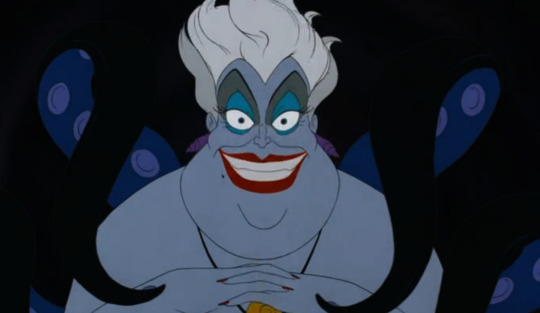
7. Ursula, from The Little Mermaid.
Consistently voiced by the late, great Pat Carroll, this cecaelian Sea Witch is certainly a unique choice on the list. In the original story of “The Little Mermaid,” the Sea Witch is a mysterious but not necessarily malicious character. She’s not someone you want to cross, but she’s not truly evil. In Disney’s treatment of the story, however, Ursula is depicted as an almost Mephistophelean character: a wily witch who makes almost Faustian bargains with merfolk, offering them the things they want most…but always for a price. With the help of her pet eels - Flotsam and Jetsam - she then sets about rigging the stakes to her advantage. Ultimately, these deals typically result in her taking her client’s souls, as she transforms them into withered, sentient, eternally-tormented polyps in her undersea garden. Ursula’s plans seem largely based around her desire for power, as well as her yearning for vengeance against King Triton. (In some continuities, Triton is her brother…Scar approves.) However, she also clearly takes gleeful delight in simply causing trouble, making other merpeople miserable and relishing every moment of their despair. She’s widely considered one of Disney’s greatest villains, and for good reason; placing her in my Top 10 here is a no-brainer.
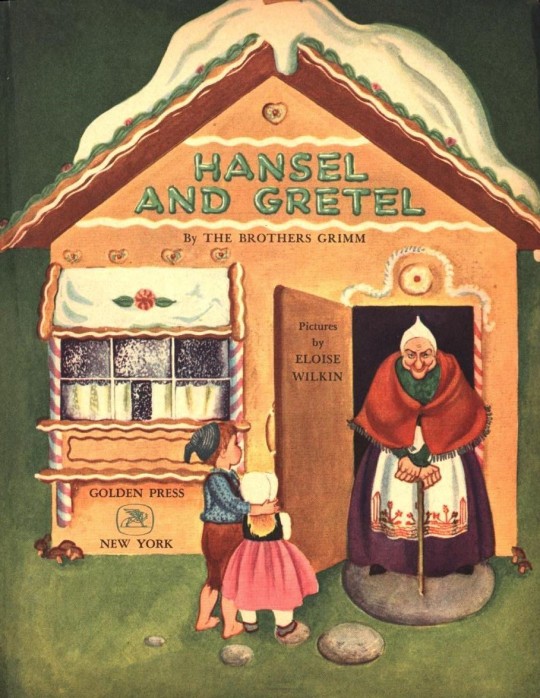
6. The Witch from Hansel & Gretel.
Much like Morgan le Fay, there have been many incarnations of this witch throughout history. However, unlike Morgan, whose levels of evil tend to fluctuate…pretty much EVERY version of this Witch is pure evil, and it’s not surprising why. In this classic fairy-tale, a pair of small children - typically abandoned in the woods by their cruel stepmother - stumble across a giant gingerbread house in a secluded part of the forest. There they meet a kindly old woman, living alone, who takes them in and offers the starving babes some food. Unfortunately, it’s quickly made clear this is a sham: the “nice old lady” is really a cannibalistic witch, who uses her tempting home as a way of luring in her favorite meals: silly children. Arguably her greatest weakness is her poor eyesight, but her other senses are so heightened it almost doesn’t matter. The brother and sister must then find a way to escape the evil crone, before they end up as her dinner. The story is one of the most well-known fairy-tales of all time, and has been adapted to film and television on numerous occasions. There’s even a rather popular children’s opera rendition of the tale, along with other theatrical productions. Some of my favorite people to play the Witch include Cloris Leachman, Rosie Perez, Joan Collins…and our old pal Billie Hayes. Yeah, Witchiepoo strikes again…like I said, Hayes must have had a VERY specific type. XD
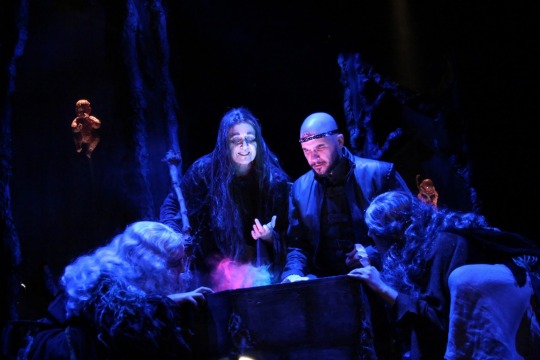
5. The Weird Sisters, from The Scottish Play.
No, I’m not saying the title, because I’m not taking any chances. But if you know your Shakespeare, you’ll know which play I’m talking about. If you don’t, however, here’s a brief little summary: a Scottish nobleman, whom we shall call “MacB,” learns from a trio of witches - referred to commonly as “The Weird Sisters” - that he will become king. Urged on by his ambitious and dangerous wife, he decides to kill the current king and orchestrate things in such a way as to seize the crown for himself, thus creating a self-fulfilling prophecy. Still unsure of his security and power, however, MacB later visits the witches again…and it isn’t long till history repeats itself, this time much to MacB’s detriment. These witches are some of the most iconic in history; their famed chanting of “Double, Double, Toil and Trouble” has arguably become more well-known than the play itself, or their role in the story. While the Witches are evil in the story, their exact motives are unclear: they seem to be bringers of chaos, simply relishing in the chance to stir up trouble with their prophecies and teasing words, leading MacB and others on then sitting back and watching the madness unfold. Some versions give them a slightly softer veneer, making them seem more like strange wise women than malicious monsters. In some versions, in fact, there are more than three Witches, instead revealing a whole coven of cackling crones, concocting vile potions and practicing scary spells in the wilds of the world. Given that this is my favorite of Shakespeare’s plays, it stands to reason these famous enchantresses would rank highly for me, but there are still a few characters I like more.
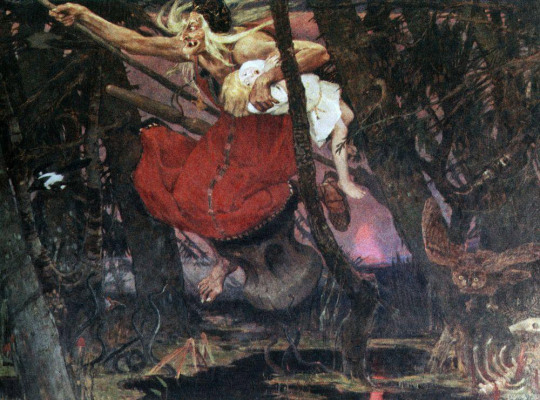
4. Baba Yaga.
If there is a quintessential fairy-tale witch, I would argue the Russian crone known as Baba Yaga fits that bill. Predating even the witch from “Hansel & Gretel” (whom she may or may not have inspired), Baba Yaga is a figure of Slavic folklore, who has appeared in many stories over the years. She is described as an ancient hag with iron teeth, who lives in a hut that is able to move around on giant chicken legs. She flies around in an oversized mortar, with a crooked broom in one hand that she uses to sweep away her tracks. In many stories, Baba Yaga is depicted as an eater of children; sometimes she lures gullible ones into her lair, other times she kidnaps naughty children and whisks them away for her supper. Of course, she doesn’t restrain her appetite to JUST kids; those who displease the Baba Yaga run the risk of being her dinner regardless. However, she is not wholly unreasonable: in some stories, she’s depicted as being somewhat like the Sea Witch - making hard but not impossible deals with mortals for her own ends. There have been many depictions of this character over the years: from animated films like “Bartok the Magnificent,” to video games like “Castlevania: Lords of Shadow" and “Rock of Ages II,” to unrelated forms of literature like “Babushka Baba Yaga.” Some of these make the witch out to be a more sympathetic character who is merely misunderstood, while others stick to her as a purely evil villainess. Arguably the greatest bogey-story of witchcraft on this whole countdown, Baba Yaga has more than earned her place in my top five.
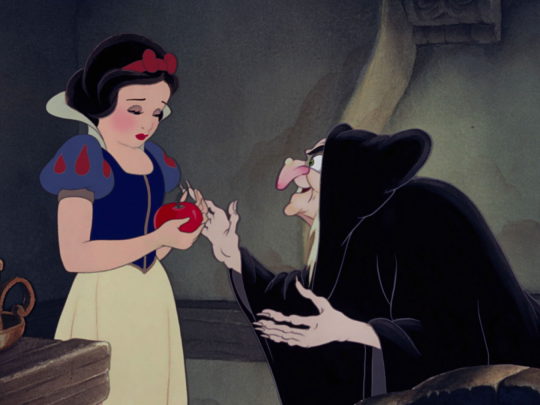
3. The Evil Queen, from Snow White and the Seven Dwarfs.
While I’m specifically talking about the Disney version here, one could easily give this placement to ANY version of the Evil Queen. In the original fairy-tale, it’s not clear if the Queen’s disguises are the work of magic or not, but considering all the other magical things around her - from the Poison Apple to the Magic Mirror to lesser-known elements - it’s not surprising many adaptations go the full monty, so to speak, and have her physically transform into a crooked old crone. Disney’s version was probably the first to take this approach, and remains the most famous. With this take on the character, you kind of get the best of both worlds with the spectrum of evil feminine spellcasters: as the Queen, she is cold, elegant, and darkly beautiful. As the Witch, she is a half-crazed, gnarled hag, complete with a cackling laugh. Both of her guises are iconic, and the scene where the Queen changes her shape for the first time is one of the most famous in the film. Like many of the other Disney Villains that would follow her, she is delightfully quotable, and set the bar many famous antagonists - including other witches - would later follow.
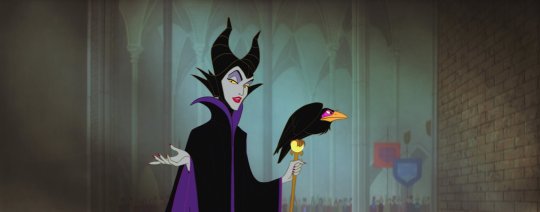
2. Maleficent, from Sleeping Beauty.
DON’T START YELLING AT ME YET. I am very well-aware that Maleficent isn’t TECHNICALLY a witch, in the strictest sense of the word. She is a dark fairy; a member of the fae. HOWEVER, I’m still going to count her because a.) she still fits the basic bill of “humanoid enchantress of the diabolical sort,” and b.) she actually HAS been referred to as a witch, in Disney-made materials no less, on more than one occasion. When you combine that with the fact she’s one of my favorite villains of all time, I think I’m justified in giving her some inclusion. While Morgan le Fay is arguably the archetypal “wretched yet beautiful sorceress” figure (and Morgan, herself, has some fairy-based origins, I should add, at least in some versions), Maleficent is the character I most quickly think about when I consider the same character type. She is regal, grandiose, and refined, yet has monstrous power and an even more monstrous temperament. As an apparent entity of evil, she seems unable to find real joy in life except when she’s causing trouble for other people, and she takes her work VERY seriously. Since her debut, she has become one of Disney’s most noteworthy villains; in many spin-off materials, such as “Kingdom Keepers” and “Kingdom Hearts,” she is depicted as a leading member of the Disney Villains, and she is consistently treated as one of the most powerful and dangerous even in her most silly reinventions. How much she really counts as a “witch” can be debated till the dragons come home, but in my books, I feel she’s worthy enough to not only make the cut, but place VERY highly.
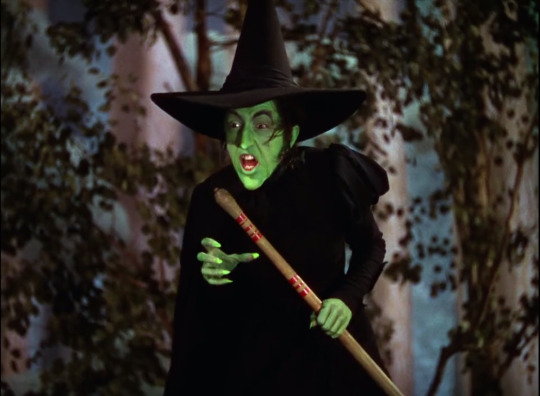
1. The Wicked Witch of the West, from The Wizard of Oz.
While Maleficent may be one of my favorite villains of all time, let’s face it: when you think of the phrase “Wicked Witch” - or, heck, probably even if you just think of the word “Witch” on its own terms - chances are high the first image that comes to your mind is this character. In the original L. Frank Baum “Oz” books, however, the Wicked Witch of the West is a relatively minor villainess: she’s just one of the many obstacles on Dorothy’s journey in the original story, and while she is arguably the most dangerous and iconic, she’s not the antagonist of the entire novel. In fact, after her infamous melting, she kind of just disappears from the series: she was an evildoer who came and went, nothing more. It was the advent of the 1939 Technicolor movie, which starred Margaret Hamilton in the role of the Wicked Witch, that made the character so popular. Much like Bela Lugosi’s Dracula or Boris Karloff’s Frankestein Monster, I feel that Hamilton’s Witch is sometimes overlooked for how EXCELLENT the performance really is; while not at all subtle, she isn’t treated like a joke in the original movie, she’s treated as a legitimate threat, and Hamilton does a great job at making her one. The popularity of the musical “Wicked” - loosely based on Gregory Maguire’s novel of the same name - I think has both bolstered and yet overshadowed Hamilton’s superb spellbinder: as much as I love Elphaba, I think people often forget or underestimate the true power of the original, TRUE Witch from the movie as a result. Other versions of the character have come and gone since, as well, but it’s this version that has remained immortal and the most influential. I see no reason not to name Margaret Hamilton’s Wicked Witch of the West as my favorite - and the definitive - Wicked Witch.
HONORABLE MENTIONS INCLUDE…
Mother Gothel, from Tangled. (Full disclosure, ALL of the HMs are related to Disney. Weird.)
Magica DeSpell, from DuckTales. (Both versions of her are great; very nearly made the cut.)
Mad Madam Mim, from The Sword in the Stone. (Relatively small role, but very fun.)
The Witches of Morva, from The Chronicles of Prydain. (They’re less wicked in the books than in the Disney film, “The Black Cauldron,” but I think they still fit.)
#list#countdown#best#favorites#top 20#wicked witches#evil witches#witches#fantasy#horror#halloween#fairy-tales#movies#tv#film#animation#anime#video games#literature#mythology
10 notes
·
View notes